





























Ameera Abraham is a beauty entrepreneur. She is the CEO and Spa Director of The Nail Bar, founder of Amali Cosmetics and the lead aesthetician at Dermaesthetics.





You might ask what inspired her to enter the beauty business. It began after she sought solace in spa sessions following the loss of her cousin. The experience ignited her curiosity about the connection between self-care and grief management, leading her to explore the beauty industry professionally in 2010. As an avid spa-goer, Abraham noticed a gap in the Abuja market after completing her NYSC. There were limited options for high-quality nail and spa services, and she believed there was a real opportunity to fill that void. Having already completed several relevant aesthetics and beauty therapy courses a few years prior, she felt well-prepared to take this leap. She wanted to create something that fulfilled her dreams and catered to the community’s needs. That’s when the idea for The Nail Bar was born, the first of her beauty businesses.
Read Ameera Abraham’s story on pages 8 to 10.
The past few months in Nigeria have been rather hot, and you will be even hotter if you wear the wrong fabric. Linen is the perfect fabric to manage your temperature in this heat because it is breathable and lightweight. That is why our fashion page this week spotlights linen pants and how to wear them. Scroll on to pages 4 and 5 for this.
Happy Mother’s Day to our friends and family in the United States. Scroll to page 14 for special meals Dad can cook for Mum this weekend.
Until next week, enjoy your read.








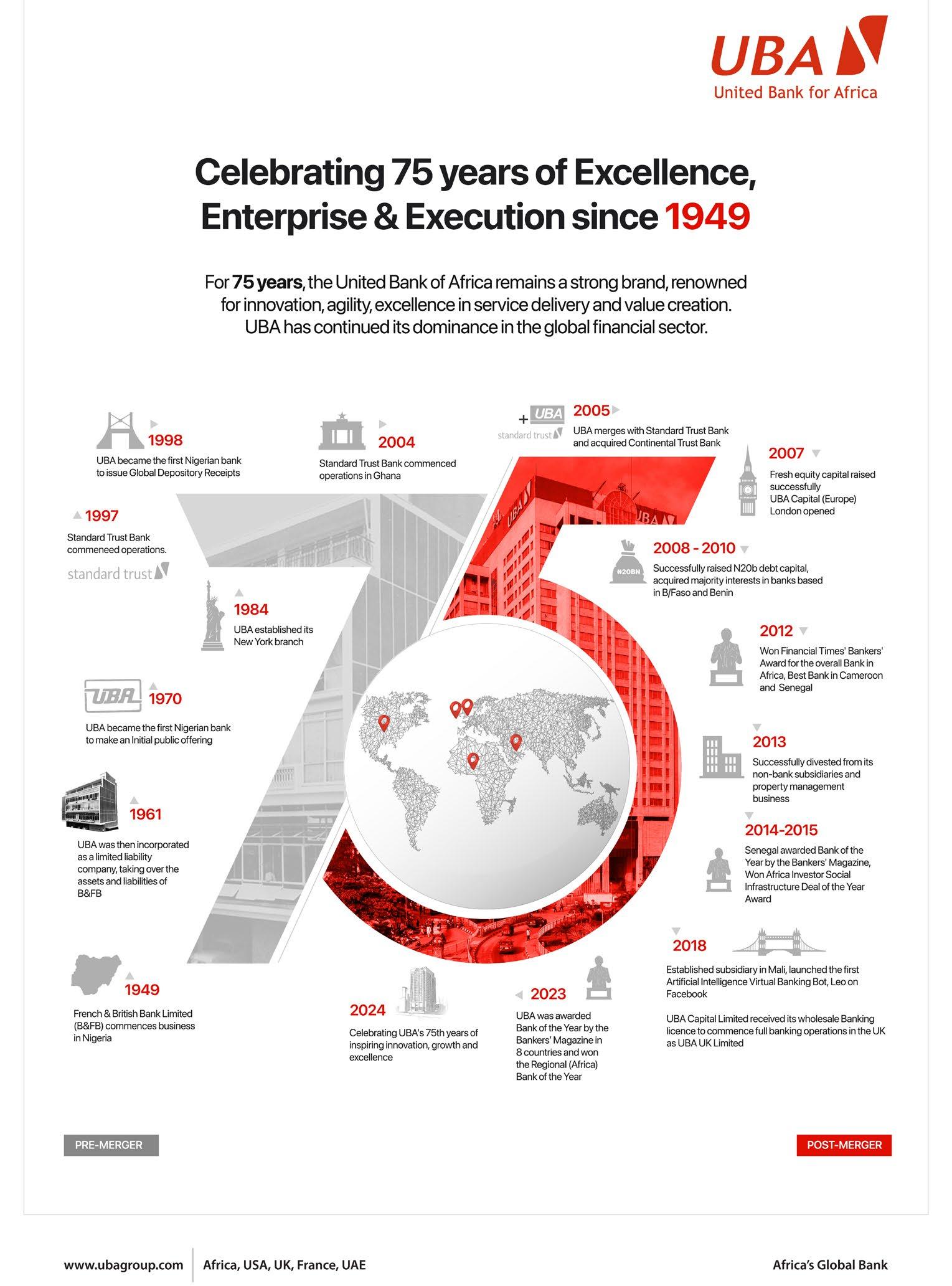



responsibility was added to his position, having been made apostolic administrator of the Diocese of Callao in Peru in that same year.
In 2021, Pope Francis had a private audience with Bishop Prevost in Rome, sparking speculation about a new role in the papacy.
Year 2023 came with a flood of appointments, perhaps the only hint at a possibility of a shot at the papacy: Bishop Prevost was called from Peru to Rome and appointed as Prefect of the Vatican Dicastery for Bishops, where he oversaw the evaluation and recommendation of episcopal candidates worldwide: Bishop Prevost is appointed as President of the Pontifical Commission for Latin America.
Then came the ultimate elevation when Bishop Prevost was made a Cardinal, followed with a further appointment as Member of Seven Vatican Dicasteries: Doctrine of the Faith; Evangelization; Eastern Churches; the Clergy; Institute of Consecrated Life and Societies of Apostolic Life; Culture and Education; and Legislative Texts. There was more to follow in that same year when Cardinal Prevost became a member of the Pontifical Commission for Vatican City State.
Then before he took ill and died, Pope Francis again promoted Cardinal Prevost, in 2025, from the rank of Cardinal Deacon to Cardinal Bishop, and assigned the Suburbicarian Diocese of Albano.
On May 8, Cardinal Prevost was elected 267th Pope, elected by 133 Cardinals. His election is seen as a divine intervention.
“The election of a Pope has some mystery surrounding it. That is why we say in the Catholic Church that those who go into the conclave come out Cardinals because many who the world ordinarily would think would emerge as Pope, come out as Cardinal, while those never considered become Pope,”
Rev. Fr Hyginus Aghaulor,” until recently, the Director of Communications, Catholic Archdiocese of Nnewi, told THEWILL on Friday. He added that, “Cardinals go into conclave where they are locked up to make sure they are not influenced in any way. They have no phone, but only prayers. Nobody mentioned Pope Leo as a major contender.”
Fr. Okhueleigbe Osemhantie Amos said even the most experienced cardinals—despite years of theological formation, pastoral leadership and curial insight— enter the conclave as participants in a sacred mystery that exceeds knowledge. Peter’s successor. Here are intriguing things even cardinals may not fully know as they enter the conclave.
balance. But the gravity of history, tradition and the Divine Will overwhelms all personal agendas once the ballots begin.
“They may unknowingly elect a saint as history has proven that conclaves sometimes elect not a manager or diplomat, but a saint—like Pope Pius X or John Paul II— whose hidden holiness becomes radiant through their papacy.”
As an Augustinian, - from the Order of Saint Augustine which was established in 1244 and named after Bishop Augustine of Hippo in North Africa in the 4th Century B.C-, Pope Leo VIX is expected to pursue and perpetuate the spiritual ideals and teaching of the Order, among other demands of his office.
“The main focus for Augustinians is on getting a community together and sharing our lives, our goods, our work,” Rev. Allan Fitzgerald, an Augustinian priest, Villanova University professor in the United States and the editor of an encyclopedia of Saint Augustine, told The New York Times on May 8, 2025.
“The most important part of what Pope Leo is talking about is bridging gaps — getting people back together and away from all the anger, the infighting,” Fitzgerald said, and “the nonsense that goes on around minor details when our humanity is something we hold in common.”
Getting people back together and away from all the infighting hold a special ring for Africans where many emergent countries are still grappling with the basic necessities of life.
Nigerian Bishop Mathew Hassan Kukah of Sokoto, who was in Rome for the event, as part of the Federal Government delegation led by President of the Senate, Godswill Akpabio, said, “St Augustine, an African, is considered one of the Church’s greatest scholars. So, taken together, we see the possibility of a continuation of the social engagement started by Pope Francis. Rerum Novarum attacked the injustices that ravaged workers and the inhumanity of capitalist exploitation in the late 20th century.”
Bishop Kukah therefore foresees the possibility of the Pope bringing his moral authority to help shape things in Africa and “effectively change the faces of injustice and corruption that is producing so much violence and destroying our continent.
He urged that the “Catholic Church must urgently reposition itself and face the challenge of engaging the structures of injustice in our continent.”
He in his speech, noting that the choice of Leo XIV as the name of the new pope bears a special significance.
“Pope Leo XIII was famous for his epic encyclical, Rerum Novarum in 1891,” Bishop Kukah said, adding, “It would be right to assume that taking the name, Leo XIV should signal where he wishes to go,”
Kukah, Pope Leo XIV “combines a trinity of identities: American, Peruvian and then Augustinian.”
IDENTITIES, CONNECTIONS AS PLATFORM
From the USA, the third largest population in the world at 347, 276,000 after India at 1,463, 870,000 and China at 1,416, 400; head of arguably the oldest Church with 1.4 billion members, alongside the Eastern Orthodox Church and an Augustinian whose patron saint, Bishop Augustine of Hippo is recognised as a Saint in the Protestant Churches and the Eastern Orthodox churches to an extent, Pope Leo XIV, many believe, has a solid platform for deploying his moral authority globally.
In a world where war and conflict between Hamas and Israel, Russia and Ukraine, Houthi rebels in Yemen, Myanmar conflict, human trafficking, racism, Illicit drug trade, corruption, poverty and human rights violations threaten global peace, the Pope’s vision on bridge-building, dialogue and love, could become provide a soothing balm if the principles pursued to their logical conclusion.
According to Father Aghaulor, Pope Leo XIV’s background shows he has a deep compassion for people, which puts him in a better position to offer moral authority that support initiatives and interventions against much suffering and pains currently ongoing around the world.
Father Aghaulor said, “From the much I know of the background of the Pope, having spent most part of his life in rural areas in South America that are poor, I would say he knows what poverty is. Secondly, as prio-general of the Augustinian Order found in 54 countries worldwide, he travelled widely and can feel the pulse of people of the world. He is somebody who would continue in the trajectory of Pope Francis who had compassion for the poor and understood the cries of those suffering.”


“Some cardinals enter the Sistine Chapel believing they are electors only to discover they are the elected. Several Popes in history, including John Paul I and Francis, were not leading candidates prior to the conclave,” he said in a piece.
He noted that though secluded, the conclave’s outcome affects over a billion Catholics and reverberates across the world stage.
For him, many of the Cardinals may be taking part in the last conclave of their lives and a chance in a lifetime to participate in the election of a Pope. Their decision will outlive them and shape the future of the Church beyond their lifetime.
“Some enter with an idea, but leave with awe: Cardinals may walk in thinking about reform, governance or
“ I hope that it will highlight the long history of Black Catholics, both free and enslaved, in this country, which includes the Holy Father’s family
In 2016, Pope Leo XIV visited Abuja, Nigeria’s Federal Capital City as part of his duties as the Augustinian progeneral and engaged with members of the order as well as the larger Catholic community.
Moral diplomacy and consistent stand against all forms of injustice on his part can help to shine the light in dark places opposed to life and human dignity, promote transparency in governance and business and encourage inclusiveness at the grassroots, many priests contend.
“To all of you, brothers and sisters of Rome, of Italy, of the whole world, we want to be a synodal Church, a Church that walks, a Church that always seeks peace, that always seeks charity, that always seeks to be close, especially to those who suffer,” Pope Leo XIV said in his first address.
“With roots in North America, citizenship in South America and experience in the Vatican, Pope Leo XIV brings a truly global outlook to the papacy,” wrote, The Nation Newspaper, on Thursday.
“You too help us, then each other, to build bridges, with dialogue, with encounter, to be one people always at peace,” Pope Leo XIV, threw a challenge to everyone in his maiden address.



Dr. Mohammed Bin Abdulaziz Al-Khulafi, Qatar’s Minister of State for Foreign Affairs, President Bola Ahmed Tinubu and Femi Gbajabiamala, Chief of Staff to the President, during courtesy visit of Qatar’s Minister on President at the Presidential Villa, Abuja, Friday 9, 2025.
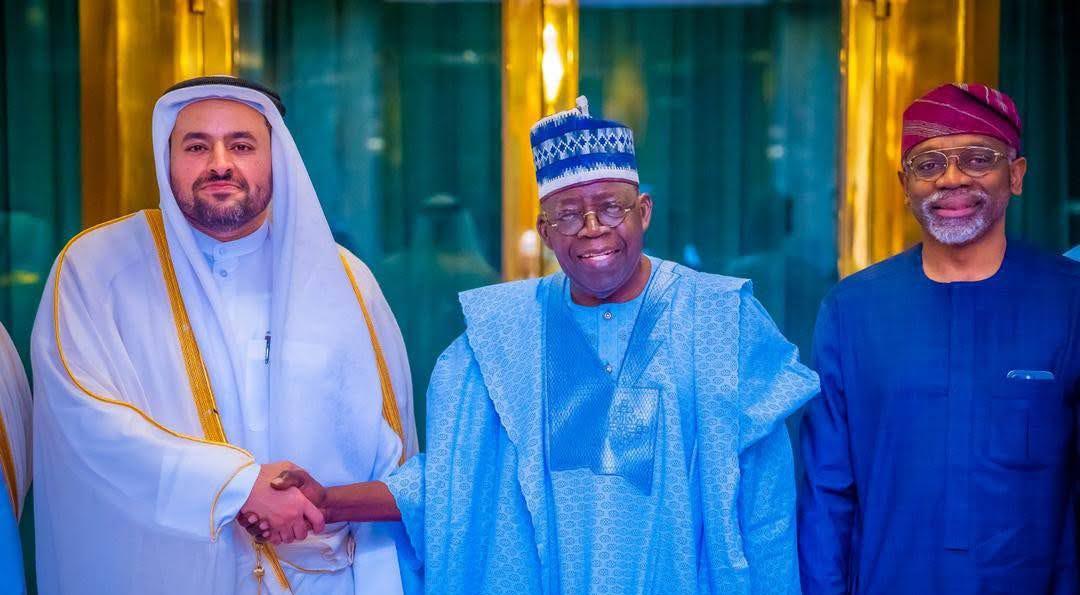
BY FELIX IFIJEH
President Bola Tinubu has welcomed fresh investment interests from the Qatari government, particularly in Nigeria’s agriculture sector, and reaffirmed the country’s readiness to deepen strategic partnerships for food security, economic development, and peacebuilding.
The President gave the assurance on Friday while receiving Dr Mohammed bin Abdulaziz Al-Khulaifi, Special Envoy of the Amir of Qatar, at the Presidential Villa, Abuja.
Dr Al-Khulaifi, who is Qatar’s Minister of State for Foreign Affairs, conveyed the Amir’s strong interest in strengthening bilateral ties and announced that a highlevel Qatari business delegation would visit Nigeria in the coming weeks to explore investment opportunities in agriculture, food security, and other key sectors. Tinubu said Nigeria was committed to implementing all agreements reached during his 2024 state visit to Qatar. He directed the Ministers of Budget and Economic Planning, Information, and Foreign Affairs to coordinate efforts to ensure the timely execution of the agreements.
“We are grateful for this partnership. I am glad the Amir remembers our discussions. Nigeria values its relationship with Qatar, and we are willing to deepen our bilateral ties,” Tinubu said.
He commended Qatar’s efforts in global peacebuilding and development, describing the Gulf nation as a

BY FELIX IFIJEH

reliable ally in Nigeria’s pursuit of regional stability and prosperity.
“I am proud of your efforts to promote peace and stability across the world. Like Qatar, Nigeria is also tackling terrorism and working to support our neighbours,” the President said.
Tinubu also highlighted ongoing reforms in Nigeria’s tax system aimed at improving the business environment for foreign investors.
“We are taking tough but necessary decisions to reform our economy and attract investments. You will not find a better partner than Nigeria,” he said, urging Qatar to expand its humanitarian and economic footprint in the country.
On his part, Dr Al-Khulaifi said the Amir of Qatar sees Nigeria as a strategic partner in Africa and is keen to scale up cooperation in agriculture, peacebuilding, and petrochemicals. “We are proud of the current level of our relations with Nigeria. Our Ambassador has been following up on our projects. We look forward to doing more, especially in agriculture and petrochemicals,” he said.
He added that Qatari companies were preparing to visit Nigeria to explore new business opportunities, noting that the partnership between both countries goes beyond governments and extends to people-to-people engagement.
The Senator representing Kebbi Central, Adamu Aliero, alongside his colleagues from Kebbi North and South, Yahaya Abubakar Abdullahi and Garba Maidoki, has announced their defection from the Peoples Democratic Party (PDP) to the All Progressives Congress (APC).
Their defection was made public on Friday after a closed-door

meeting with President Bola Tinubu at the Presidential Villa, Abuja. The senators were led to the meeting by the APC National Chairman, Dr Abdullahi Ganduje. Also present were key political leaders from the North-West, including Kebbi State Governor, Nasir Idris; Sokoto State Governor, Ahmad Aliyu; and Minister of Budget and Economic Planning, Atiku Bagudu.
BY ABDULLAHI YUSUF
The Kano State Government has released the 2024 Senior Secondary Qualifying Examination results, reaffirming its commitment to improving access to quality education and easing the financial burden on families.
The State Commissioner of Education, Alhaji Ali Haruna Makoda, disclosed this during a press briefing in Kano on Friday evening. Makoda said the announcement aligned with Governor Abba Yusuf’s Education Reform Agenda.
According to him, the reform agenda has already seen the declaration of a State of Emergency on the Education sector and the allocation of 31.5 percent of the 2025 budget to education.
He disclosed that 141,715 candidates from public schools under the Kano Educational Resource Department (KERD), the Science and Technical Schools Board (STSB), and the Agency for Integrated Education Development (AIED) sat for the 2024 examination, with over 75% qualifying for state sponsorship.
“In 2023, a total of 125,000 candidates were sponsored by the State Government. This year, His Excellency, Governor Abba Kabir Yusuf, has graciously approved the sponsorship of all indigent state candidates who scored a minimum of five credits in the 2024 Senior Secondary Qualifying Examination”, he said. The commissioner said the beneficiaries would have their registration fees fully covered for the 2025 NECO, NABTEB, NBAIS, and SSCE national examinations.
He said the initiative would cost the state government over N3 billion. “This is a timely and bold initiative by the Kano State Government to promote academic excellence, increase access to education, and ease the financial burden on vulnerable families,” he said.
He directed school principals to ensure that all eligible candidates benefited from the scheme without any form of bias or obstruction. “They must access their rights unconditionally and with full transparency,” he said.
The commissioner said more details on the registration process would be communicated to schools and the public through the relevant education agencies such as the KERD, STSB and AIED.
“With this development, Kano joins a select few Nigerian states demonstrating a strong financial and policy commitment to supporting youth education.
L-R: General Manager, Lagos State Wastewater Office, Mr. Adefemi Afolabi; Commissioner for Environment and Water Resources, Mr Tokunbo Wahab; Director Drainage Enforcement and Compliance, Mr Sunday Awe; Special Adviser on Environment, Mr. Olakunle Rotimi-Akodu and Permanent Secretary, Office of the Drainage Service, Ministry of Environment, Mr. Mahmood Adegbite, during the drainage enforcement inspection visit to Ikota River extending to Ora extension, West end, Mega mond in Lagos on Thursday (8/5/25).
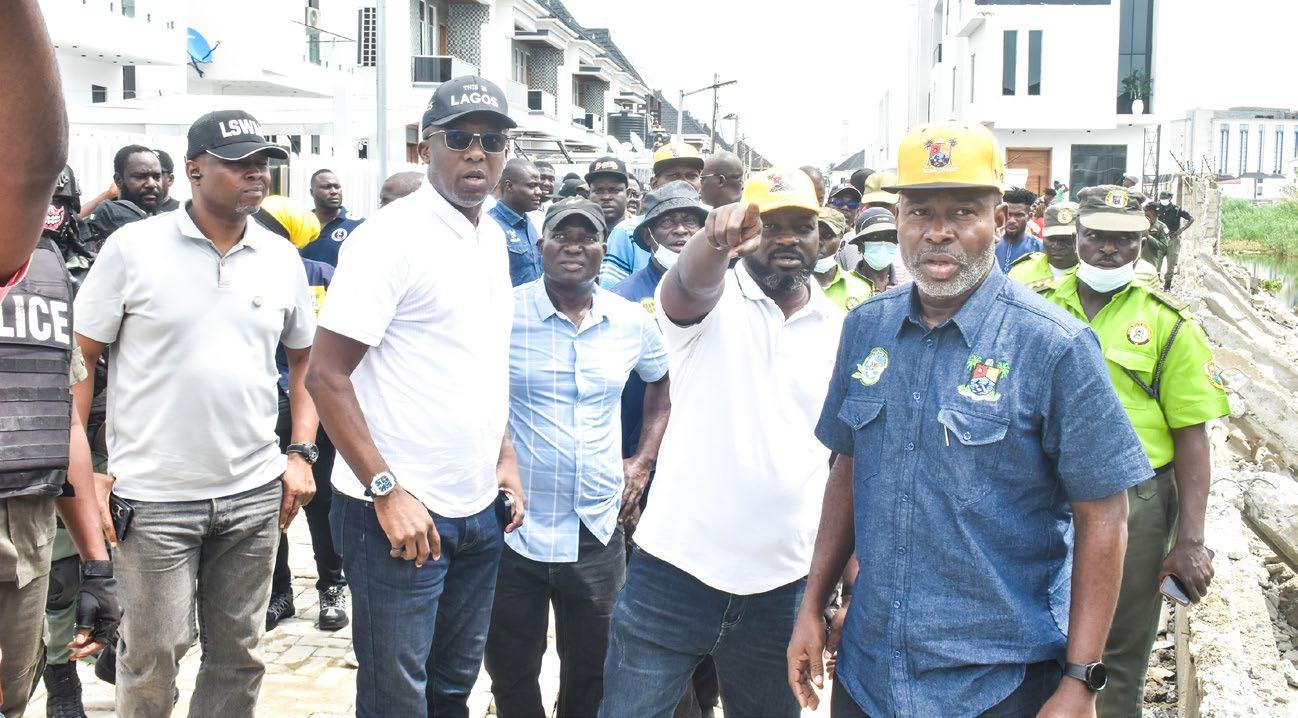
BY ANTHONY AWUNOR
History was made on the night of May 9, 2025, as the Sam Mbakwe International Cargo Airport in Owerri, Imo State, witnessed its first-ever international flight since its inception. The landmark event was the departure of the inaugural 2025 Hajj flight, operated by Nigeria’s leading carrier, Air Peace. Making the feat even more remarkable was the deployment of the wide-body Boeing 777-300 aircraft, the first time such a large aircraft landed on the Owerri airport runway. This demonstrated the airport’s enhanced capacity and readiness to handle international operations of global standards.
A total of 315 pilgrims were airlifted on the non-stop inaugural flight from Owerri to Medina, Saudi Arabia, marking a new chapter for the South-East region in religious tourism and international connectivity. This historic development not only represents a significant milestone for the Sam Mbakwe International Cargo Airport but also underscores Nigeria’s growing aviation capabilities in expanding international operations across all geopolitical zones.
The Vice President of Nigeria, Senator Kashim Shettima, personally flagged off the flight, commending Imo State Governor, Senator Hope Uzodinma, for promoting religious tolerance and inclusiveness in the state. In his
address, the Vice President encouraged the pilgrims to uphold Nigerian values and serve as true ambassadors of the nation while in the Holy Land.
Governor Uzodinma, in his remarks, reiterated his administration’s commitment to enhancing the state’s aviation infrastructure. He emphasised that the airport would also support the airlift of Christian pilgrims in future exercises, further positioning Owerri as a hub for religious and international travel.
Also present at the historic event was the Sultan of Sokoto, His Eminence Muhammadu Sa’ad Abubakar III, alongside other dignitaries and religious leaders from across the country, lending credence to the unity and national significance of the occasion.
This successful flight also comes as a strong rebuttal to recent rumours suggesting the suspension of Air Peace from Hajj operations. Not only has the airline continued to uphold its reputation as a dependable partner in national service, but it has also inaugurated the 2025 Hajj operations from a new departure city, Owerri.
With this development, Air Peace and the Sam Mbakwe International Cargo Airport have entered the annals of history, signalling a new era of regional integration, religious harmony, and aviation excellence in Nigeria.
BY ANTHONY AWUNOR
BY SEGUN AYINDE, ABEOKUTA
The Chairman of the Motorcycle Operators Union of Nigeria (MOUN), Ogun State Chapter, Comrade Salaudeen Amoo, has appealed to Governor Dapo Abiodun to grant the union operational rights to contribute to the state’s Internally Generated Revenue (IGR).
Amoo made the appeal on Friday, stating that the union is duly registered with the Federal Ministry of Labour and Employment under the Trade Union Act, and therefore qualified to operate legally in the state.
He urged the Abiodun-led administration to issue revenue tickets to MOUN, enabling the union to officially collect dues and remit revenue to the state in line with its economic development drive.
The chairman noted that several states, including Oyo, Lagos, Ondo, Akwa Ibom, and Kwara, have already recognised MOUN’s legal status and are preparing to commence operations. He appealed to the Ogun State Government to follow suit.
“We are aware of the remarkable projects Governor Dapo Abiodun has embarked on — roads, electricity, housing schemes, and solar-powered street lights. We want to support and be part of that progress,” Amoo said.
He stressed that MOUN is not in competition with any existing motorcycle operators’ associations in the state, such as ACCOMORAN or ROMO, but seeks collaboration to improve the welfare of riders and the general public.
Socialite and businessman, Fred Ajudua, has lost the bail granted him in 2018 by the Court of Appeal in Lagos, following his arraignment by the Economic and Financial Crimes Commission (EFCC) over alleged fraud to the tune of $1,043,000.
Justice Garba granted bail to Ajudua on December 10, 2018, a decision challenged by the anti-graft agency at the apex court.
Ruling on the appeal on Friday, the apex court held that the Appeal Court erred by granting bail to Ajudua.
While it ordered Ajudua’s return to correctional custody, the court directed Justice Mojisola Dada of the Lagos State High Court to resume hearing of the fraud trial.
THEWILL reports that the EFCC had alleged that Ajudua,
alongside one Joseph Ochunor (at large), allegedly conspired in 1993 to obtain $1.6m by false pretences from Ziad Abu Zalaf of Technical International Ltd., a division of Mystic Company Ltd., a German-based company. The EFCC alleged that the defendants deceived the victims by claiming that the money was for sundry payments to various government officials. It further alleged that the defendants claimed that the payments would help them to facilitate a contract worth $18 million on behalf of the complainants.
The matter had suffered a series of adjournments owing to the failure of the EFCC to produce some key foreign witnesses in the matter until 2018, when Ajudua was granted bail by the Lagos Division of the Appeal Court.

“We are not rivals. MOUN is a recognised trade union for motorcycle operators in Nigeria. ACCOMORAN and ROMO are associations. We hold no grudges; we are brothers working towards the same goal,” he added. Amoo also pledged that part of the revenue generated through official operations would be reinvested into the state through community development initiatives.
He added, “We want to give back to the people of Ogun State by providing amenities that will improve their standard of living. But we can only do this if given the opportunity to operate officially and generate revenue for the state.”


L-R: Non-Executive Director, FrieslandCampina WAMCO Nigeria Plc, Oyinkan Ade-Ajayi; Managing Director, Roger Adou; Chairman, Board of Directors, Moyo Ajekigbe; Non-Executive Director, Roel van Neerbos; and Non-Executive Director, Olayinka Sanni, during the 52nd Annual General Meeting of FrieslandCampina WAMCO Nigeria Plc, held in Lagos on May 8, 2025.
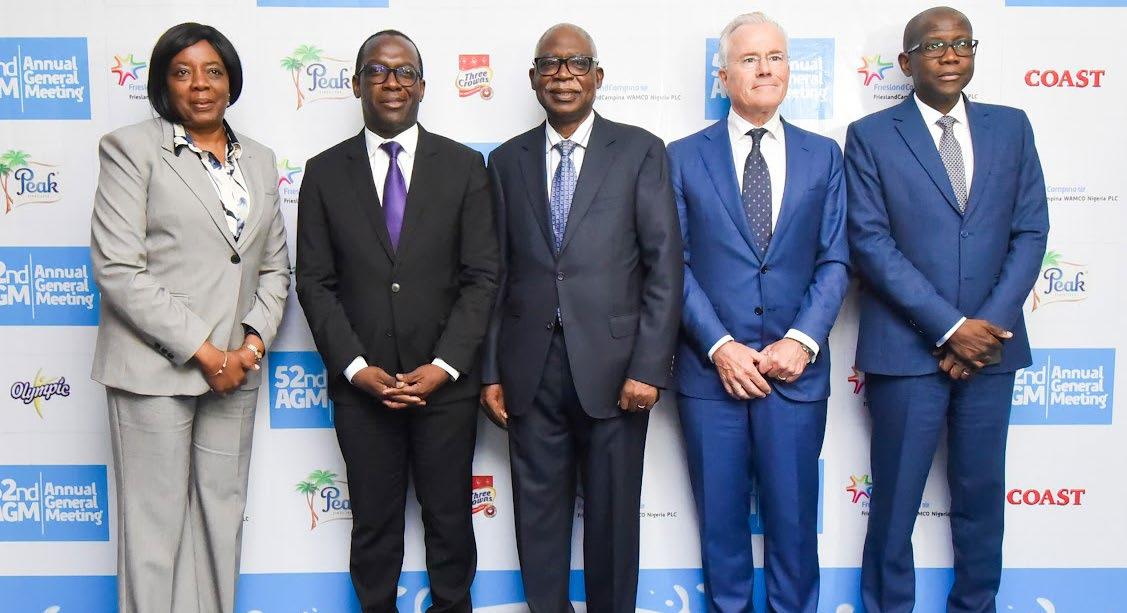
BY ABDULLAHI YUSUF


undreds of supporters of the Senator representing Kano South, Sulaiman Kawu Sumaila, have declined to defect to the All Progressives Congress (APC) and have decided to stay in the New Nigeria People’s Party (NNPP).
Sen. Sumaila had recently defected from the NNPP to the APC, citing an internal crisis, which he said is bedevilling the NNPP.

Led by Muntari Ibrahim Faruruwa, among others, the former Senator’s supporters, who are from Takai Local Government Area, were received by the leader of the Kwankwasiyya political movement, Sen. Rabiu Musa Kwankwaso, at his residence located on Miller Road, Kano, on Friday.
“Our great leader, we are here to inform you that we have refused to join the APC alongside the Senator representing our zone. Instead, we prefer to come back home. So, we are back.
“We thought it wise to return home so as to continue to propagate the ideals of the Kwankwasiyya movement and the NNPP, as well as contribute our quota to the development of our dear State.
“We hope that we will be accepted back and reintegrated into the Kwankwasiyya movement and the NNPP to enable us to enjoy the same rights and privileges as other members”, the group said.
Receiving the returnees, Sen. Kwankwaso welcomed them and congratulated them for seeing the light and returning to the Kwankwasiyya movement and the NNPP.
He said the Kwankwasiyya movement is about empowering people, especially youths and women, through education and other means to enable them to become self-reliant, to develop themselves and society.
“On behalf of myself, His Excellency, the Governor of Kano State and the State Government, the NNPP and the Kwankwasiyya movement, I congratulate you for taking this all-important decision.
“I pray that all other members of this movement who had left us will return home so as to continue to contribute their quota to the progress and development of Kwankwasiyya and Kano State”, Kwankwaso said.
In his remarks, Senator Rufa’i Sani Hanga(NNPP Kano Central) described Sen. Kwankwaso as a progressive leader who had always championed the upliftment of ordinary people.
Hanga said the leader of the Kwankwasiyya movement demonstrated these qualities during his two tenures as the Governor of Kano State when he developed the state, especially in the provision of infrastructure in such areas as education, health, agriculture and roads.
He congratulated the former Sen.Sumaila supporters for taking the wise decision to return to the Kwankwasiyya movement and the NNPP fold and wished them a successful stay in the system.
BY KAJO MARTINS, MAKURDI
The Benue State Government has said that the ongoing construction of a tractor assembly plant in Makurdi will significantly enhance agricultural productivity, ensure food sufficiency, and improve the economic wellbeing of farmers across the state and beyond.
Deputy Governor Dr. Sam Odeh made this known during the Benue International Economic Investment Summit in Makurdi. He explained that the initiative by the Alia-led administration is a deliberate effort to promote large-scale mechanized and irrigation farming, with a focus on processing, packaging, and export.
“With our energetic youth population, Benue is ready to take off. The government is open to private sector participation, particularly in health, education, and agriculture. We urge
investors to take advantage of the peaceful environment and invest in the state,” Odeh said.
He further encouraged investors to establish juice factories, soybean processing facilities, and yam-based industries, noting that the state is rich in raw materials.
Meanwhile, the state government has distributed over 9,000 units of agrochemicals at subsidized rates to farmers across the 23 local government areas.
Commissioner for Agriculture and Food Security, Prof. Moses Ogbaji, while addressing Divisional Agriculture Officers, said Governor Hyacinth Alia procured large quantities of herbicides to ensure that each local government receives at least 400 cartons.
BY AMOS OKIOMA
Bayelsa State Governor, Douye Diri, has commended security agencies for their commitment and sacrifice in maintaining peace and order across the state.
Governor Diri gave the commendation during a dinner organised by the state government in honour of staff and students of the Armed Forces Command and Staff College, Jaji, who were on a study tour of the state. The event was held at the Chief Dappa Biriye Conference Centre in Yenagoa.
Represented by his deputy, Senator Lawrence Ewhrudjakpo, the governor acknowledged the synergy among security agencies operating in the state and urged them to sustain the collaboration to effectively address the state’s security challenges.
He reiterated his administration’s commitment to making Bayelsa the most peaceful state in Nigeria, thereby attracting both local and international investments to drive economic growth and prosperity.
While appreciating the study team for choosing Bayelsa for their tour, Diri expressed hope that the outcome of their research would be shared with the state government to help strengthen its security strategies.
He said, “The Bayelsa State Government has done its best in the area of security, but we believe your study will provide insights and serve as a compass for us to improve where necessary.
“You will help us build a more resilient, robust, and committed security system in Bayelsa. We are determined to create a peaceful and productive environment for our people.”
The governor also praised the support and cooperation of various security agencies in the state, attributing Bayelsa’s relative peace to their effective collaboration with the government.
In his remarks, the Coordinator of the Senior Course 47 Study Tour to Bayelsa, Brigadier General Ernest Orakwe, described the visit as highly successful, citing the overwhelming support and hospitality of the state government.
He assured that the findings from the tour, themed “Harnessing Grassroots Intelligence for Enhanced Internal Security Operations,” would be compiled and made available to the state to enhance its internal security architecture.
L-R: Deputy Chief of Staff to the President, Office of the Vice President, Sen Ibrahim Hadejia; Technical Adviser to the President on Economic and Financial Inclusion, Dr Nurudeen Zauro and the Technical Adviser, Public Management and Revenue, Office of the Vice President, Dr Ibrahim Natagwadu during the inaugural meeting of the Technical Committee of the Presidential Committee on Economic and Financial Inclusion at the Presidential Villa in Abuja.
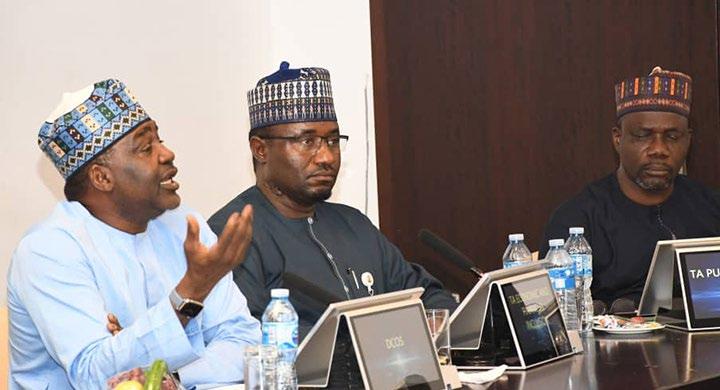
FROM UDEME UTIP, UYO
The Chairman, National Sports Commission (Nsc), Mallam Shehu Dikko, Has Disclosed That Plans Are Afoot By His Commission To Collaborate With The Federal Ministry Of Education To Create Centres Of Excellence Around Schools As The Basis Of Grassroots Sports Development.
According To Him, Each Part Of The Country Is Intended To Have: One University As A Centre Of Excellence In Sports, Each State To Have One Secondary School As A Centre Of Excellence For Sports, Even As Each Local Government Will Have One Primary School As A Centre Of Excellence For Sports.
The Nsc Chairman, Who Bared The Minds Of The Federal Government Through His Commission, During The Closing Ceremony Of The Mtn Champs Season 03 In Uyo, On Friday, Said The Creation Of Excellence Centers For Sports Is Aimed At Giving The Youths The Path To Grow To The Best They Can Be In Their Own Chosen Career In Sports.
The Focus Of Sports In Nigeria At The Moment Is Youth Development And Is Targeted At The Grassroots. This Is Why The President Appointed A Special Committee On Grassroots Sports, Because Of The Vision And The Mindset That Grassroots Sport Is The Future.
“I Must Commend Mtn Especially For What They’re Doing With This. It Is Quite Commendable. It’s Quite Brilliant. This Is In Alignment With The Vision Of The President, To Give The Youth The Opportunity For A Better Future, And This Is Why We Had To Be Here”, He Noted.
And The Spirit Of The Young Athletes.
“We Have Witnessed Raw Talent, Unwavering Dedication, And The Bright Future Of Nigerian Athletics Unfold Before Our Very Eyes. The Mtn Champs Is Not Just A Competition, It Is A Platform For Dreams.” Kadiri Said
Kadiri Also Acknowledged The Support Of The Governor Of Akwa Ibom State, Pastor Umo Eno, And The Hospitality Of The Host State. She Also Acknowledged The Role Of Local Institutions In Creating An Enabling Environment For Youth Sports To Thrive.
“We Have Been Deeply Touched By The Incredible Hospitality And Beauty Of Akwa Ibom State”, She Said.
The Inter-School Competitions During The Uyo Finale Were A Key Highlight, With Schools Competing In Both Cadet And Youth Categories. Results Showed Strong Performances From Akwa Ibom-Based Institutions, Positioning Them As Hubs Of Future Athletic Excellence.
Community Secondary School, Itam, Emerged First Prize Winner With 26 Points For The Cadet Girls Trophy, Lutheran High School, Obot Idim, Emerged Second With 23 Points, While Ibiaku Itam Emerged Third With 22 Points.
Immediate past governor of Anambra State, Chief Willie Obiano, has reiterated his unwavering commitment to inclusive development, revealing that under eight years, his administration successfully executed two different projects in each of the 21 local government areas of the state.
This landmark achievement is, no doubt, an indication of Obiano’s focus on even development, whereby no region or group in Anambra was left out in the transformation that characterised his regime.
In addition to the local council-centred projects, Obiano’s administration also initiated and completed one development project in each of the 179 communities across the state, amid the COVID-19 pandemic. All the projects were executed under the now-celebrated N20m Community-Choose-YourProject initiative, which gave local communities the power to determine and drive development priorities tailored to their unique needs.
“This project was not merely infrastructure; it was about providing our communities with a voice, empowering local leaders and building ownership of development,
“Every penny of that N20m circulates in each community. The labourers, engineers, supervisors and others were from the communities. The money for each community stayed in that particular community and go out. The money created a velocity of money. It would not have happened if the people (workers) were from other states,” Obiano said.
Our Correspondent Reports That The Third Season Of Mtn Champs Concluded With A Finale Marked By Local Triumphs, Raw Talent, And The Unveiling Of Nigeria’s Next Athletic Mvps.
No Fewer Than 10 Additional Most Valuable Performers (Mvps) Were Announced To Be Added To The Mtn Champs Academy, Which Now Holds 30 Elite Youth Athletes, Including Three Standout Mvps From Akwa Ibom State.
The Grassroots Athletics Competition, Which Spanned Three Cities, Benin, Lagos, And Uyo, Saw Over 7,000 Young Athletes Register To Compete In Track And Field Events Designed To Discover And Nurture The Country’s Next Generation Of Sporting Stars.
At The Closing Ceremony, Modupe Kadiri, Chief Financial Officer Of Mtn Nigeria, Applauded The Level Of Performance
In The Cadet Boys Trophy, Aunty Iso International School Emerged First With 29 Points, Followed By Lutheran High School With 14 Points And Four Towns Community School With 11 Points.
For The Youth Gurls Trophy, Charity Of The Most Precious Blood Emerged First With 35 Points, Followed By Lutheran High: 21 Points And Ikot Ibiok Girls With 20 Points. On The Youth Boys Trophy, Aunty Iso International School Emerged First With 17 Points, Osadenis Mixed Secondary Took Second With 16 Points And Presbyterian Senior Science School, Ididep Scored 16 Points To Emerge Third.
Bringing The Weeklong Event To A Close, Governor Umo Eno, Represented By The Secretary To The State Government, Mr. Enobong Uwah, Commended Mtn Nigeria For Its Commitment To Youth Development.
He Noted That The Initiative Aligns Perfectly With His Administration’s Arise Agenda And Pledged Continued Support For Programs That Empower Young People Across The State And Country At Large.
According to him, this made Anambra to be one per cent above line. In other words, the state did not go into recession, like other states, during the pandemic because of the velocity of money.
Interestingly, even in Obosi and Onitsha urban settlements, which boast clear urban and main locations, the government initiated two projects, one in Obosi Urban and the other in Obosi Main. There is also one each in Onitsha Urban and Onitsha Main, doubling the investment to N40m to match the size and development the settlements need.
The projects ranged from street lighting and road upgrade to town halls, water supply systems, civic centres and health centres. They were all carefully selected by the residents.
Local leaders and observers have continued to commend the initiative as a model of participatory government and a benchmark for future governments in the state and beyond. Obiano’s tenure is widely remembered for pioneering inclusive grassroots development, economic modernisation, and the transformation of Anambra’s physical and social infrastructure.






BY AMOS OKIOMA
National Security Adviser (NSA), Mallam Nuhu Ribadu, has reassured Nigerians that the federal government is taking strong action against oil vandals threatening national assets and local communities.
Speaking on behalf of the NSA during a stakeholders meeting organised by Pipeline Infrastructure Nigeria Limited (PINL), to appraise the company’s operations on the Trans Niger Pipeline, the Special Adviser on Energy, Security and Finance to the NSA, Amakiri Harry-Young, revealed that a special committee comprising investigative and prosecuting teams has been working round the clock to ensure offenders face justice.
Harry stated that over 100 suspects have already been prosecuted, with 15 recently sent to Port Harcourt prison. According to him, “This move follows concerns raised during a previous meeting about the arrest and quick release of oil vandals, which often leads to further insecurity in affected communities.”
He emphasised that the administration is fully committed to achieving the national oil production target of 2.5 million barrels per day. “The President is serious about the 2.5 million barrels, and we are doing everything necessary to reach that goal”, Harry said, adding that success will depend on the collective efforts of all stakeholders involved.
In his opening address, the PINL Consultant, Communities Relations, Dr Akpos Mezeh, said that the PINL has recorded major successes in safeguarding the Trans-Niger Pipeline (TNP) through close collaboration with host communities, government security agencies, and other key stakeholders.
He also started that by investing in community needs, resolving disputes, and restoring the environment, PINL has helped reduce crude oil theft and pipeline vandalism, adding that the result has been near-zero infractions on the pipeline, improved crude oil


production, and greater investor confidence, all contributing to increased national revenue. Mezeh also stated that in addition to strengthening local ties, PINL has also supported economic empowerment, ensured regular payment of surveillance guards, and promoted safety by deploying military camps and porta cabins.
Also, the President of the Ijaw National Congress (INC), Prof. Benjamin Okaba, stressed that Ijaw communities have always supported Nigeria’s unity and economic stability, even taking the lead in the management of pipelines through companies like PINL. He urged for full support for PINL, emphasising that any success in protecting pipelines should also credit the Ijaw people.
Prof. Okaba criticised the current terms of the Petroleum Industry Act (PIA), especially the three percent allocation to host communities, calling it an insult. He called for better agreements and full respect for such terms by both the company and the federal government.
Speaking on behalf of the traditional rulers of the host communities in Southern Ijaw, Ogbia and Yenagoa local government areas, His Royal Majesty, King (Dr) WSJ Igbugburu X, the Ibenanawei of Bomo Kingdom, Southern Ijaw LGA, praised the company for its consistent engagement with stakeholders.
The respected monarch commended PINL for setting an example in community involvement, noting that no other pipeline surveillance firm operating in the region has shown such commitment. He urged the federal government, especially the Ministry of Petroleum Resources, to also hold regular meetings with stakeholders and surveillance companies to help reduce pipeline vandalism and boost oil production. He further called on other surveillance firms to rise to the occasion and work collectively to eliminate criminal activities in oil-producing communities.

BY ABDULLAHI YUSUF
The Chairman of Dangote Group and Chancellor of Aliko Dangote University of Science and Technology, Wudil, Kano State, on Saturday, unveiled a five-year development plan for the university with an initial sum of N15 billion.
Dangote announced the plan shortly after his second investiture as the Chancellor of the University, at the 5th Combined Convocation ceremony of the institution, held at Wudil, near Kano.
He said the funds which would be managed through his Foundation would be used for the construction of additional student hostels, a world-class engineering laboratory, a world-class computer laboratory with 24hour Internet service and a befitting Senate building. Additionally, the Dangote Foundation would give automatic employment to the best graduating students in its various companies across the country.
In his speech, the Vice Chancellor of the university, Prof. Musa Tukur Yakasai, said over 18,000 students are graduating across various disciplines, covering seven combined graduating sets.
Out of the number, Yakasai said, 2,950 Postgraduate students are receiving their degrees and Diplomas.
Also speaking, Kano State Governor, Abba Kabir Yusuf, pledged to complete all ongoing projects being executed by the State Government within the shortest possible time.
“We are committed to completing all ongoing projects initiated by the previous administration in order to enhance the development and growth of the institution”, the governor said.
A total of five Eminent Nigerians who distinguished themselves in various spheres of human endeavours were conferred with honorary doctorate Degrees (Honoris Causa) at the event.
The awardees were Senator Rabi’u Kwankwaso, Alhaji Dahiru Barau Mangal, Dr Ahmed Adeniyi Raji (SAN), Prince Arthur Ikpechukwu Eze and Alhaji Mustapha Ado Muhammad.
In his remarks on behalf of the awardees, Senator Kwankwaso thanked the university management for finding them worthy of the honour.
He congratulated the graduating students and urged them to always be good ambassadors of the university wherever they find themselves.

BY KAJO MARTINS, MAKURDI
The ongoing tug of war between Governor Hyacinth Alia of Benue State, his Zamfara counterpart, Dauda Lawal, the Houses of Assembly of both states and the National Assembly over summons for oversight appearances continued over the weekend.
According to the House of Representatives Committee on Public Petitions, the governors and their respective state assemblies were summoned to appear in the National Assembly on Thursday, May 8 unfailingly, over alleged constitutional violations and governance failures.
In Benue, the controversy deals with the suspension of 13 lawmakers believed to be opposed to Governor Alia, who is facing charges of abuse of power for suspending the Chief Judge of the state, Justice Maurice Ikpambese, with the approval of the State House of Assembly.
In Zamfara, on the other hand, there is a prolonged legislative standoff involving a faction of the suspended lawmakers until recently, thereby creating a parallel legislative structure in the state. Moreover, both states are hard-hit by deep-rooted insecurity and other challenges that are negatively impacting good governance.
On the fateful Thursday that the summons lapsed, a group of lawyers, numbering about 1,000, joined the fray. On the platform of the Save Benue and Zamfara Coalition, the lawyers protested before the National Assembly, urging it to take over the functions of the Houses of Assembly in Benue and Zamfara.
The protesters, led by Sambari Benjamin, argued that the two houses are unable to perform their constitutional duties due to internal crises and alleged interference by the state governors. According to them, 10 lawmakers have been suspended in Zamfara since February 2024 on the instructions of Governor Dauda Lawal for raising the alarm over the rising insecurity in the state.
Similarly, in Benue, the coalition stated that 13 lawmakers were suspended for allegedly disobeying Governor Alia’s instruction to suspend the Chief Judge of State. Supporting the House Committee’s summons to the governors and their Houses of Assembly, they urged the National Assembly to invoke Section 11(4) of the Constitution, which allows the parliament to make laws for the peace, order, and good government of a state when the House of Assembly is unable to perform its functions. The lawyers warn that if the situation is not addressed, it may lead to a state of emergency being declared in the two states.
They also expressed concern that the crisis could spread to the National Assembly, potentially threatening its stability. Claiming legislative and constitutional rascality on the part of the National Assembly, both governors and the leadership of their assemblies rejected the invitation.
The Benue State House of Assembly passed a resolution calling on the Speaker, Rt. Hon. Hyacinth Aondona Dajoh, to disregard the summons from the National Assembly Public Petition Committee to appear before it.
The Assembly argued that the summons contravenes the Constitution of the Federal Republic of Nigeria (1999) as amended; planning to take legal action against the National Assembly, while also requesting the Nigerian Bar Association (NBA) and the Inspector- General of Police to investigate the individuals who signed the petition.
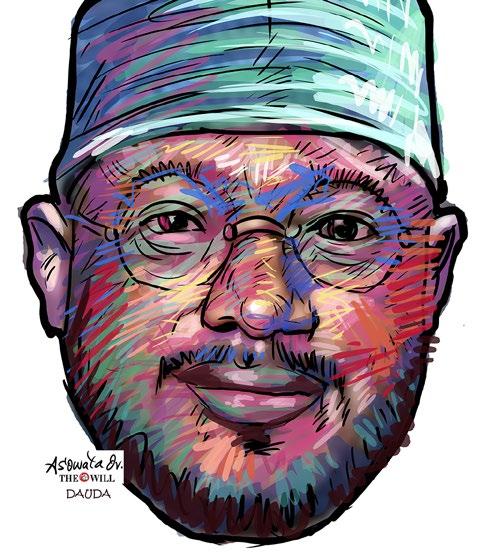
Members of the Benue Assembly also called on the National Assembly Caucus from Benue State in the Senate and House of Representatives to come for proper engagement with the House to ascertain why the state is portrayed in a bad light at the National Assembly.
Lending his voice to the petition sent by the National Assembly summoning the Speaker and leadership of the Assembly to appear on Thursday, May 8, 2025, Majority Leader of the House, Comrade Saater Tiseer, argued that the notice sent by the National Assembly was done out of ignorance.
According to the lawmaker, by the Constitution of the Federal Republic of Nigeria, the Benue State House of Assembly is not answerable to the National Assembly, pointing out that section 101 has given the house the powers to legislate on its business without external control.
Contributing, the member representing Katsina-Ala West State Constituency, Hon. Bemdoo Ipusu, accepted the decision of the house to take the National Assembly to court, adding that the house should include the Guidance of Democracy for misleading the National Assembly.
The investigative and oversight powers of the National Assembly under Sections 88 and 89 of the Constitution are restricted to matters within the legislative competence of the Federal Government “
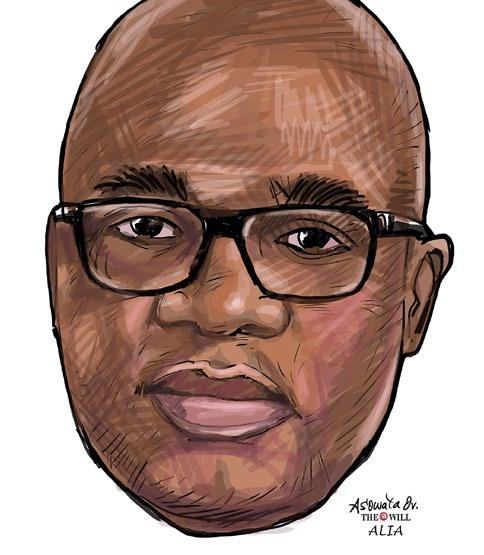
Hon. Ipusu noted that the group, in mentioning the names of the suspended members, also listed Hon. Peter Uche, which shows that the group lacks knowledge of what transpired on the floor of the House that fateful day.
He wondered why the National Assembly would want to take over the functions of the State House of Assembly that is vibrant and performing its duties effectively, noting that the three arms of government in the state are not fighting each other.
Other members, including Hon. Michael Audu and Hon. Peter Uche, condemned in totality the decision of the National Assembly and urged the Speaker and the leadership of the state Assembly not to honour the invitation to appear.
Hon. Uche said he is still performing his duties in the house as elected and expected by his people, and wondered why the group included his name alongside those suspended, which clearly shows that the National Assembly was not properly informed. Similarly, the Chairman of the Zamfara House Committee on Information, Kabiru Dangulbi, said the summons lacked a legal basis.
The Conference of Speakers of State Legislatures of Nigeria waded in on behalf of the Zamfara and Benue Houses of Assemblies. has rejected the summons issued to the Benue and Zamfara State Houses of Assembly by the House of Representatives Committee on Public Petitions. According to the Conference, through its Chairman and Speaker of the Oyo State House of Assembly, Adebo Ogundoyin, the summons by the National Assembly was “an overreach of constitutional powers, a direct challenge to Nigeria’s federal structure, and a breach of the autonomy of state legislatures as guaranteed by the 1999 Constitution, “ adding that “The investigative and oversight powers of the National Assembly under Sections 88 and 89 of the Constitution are restricted to matters within the legislative competence of the Federal Government.”
The Conference warned that attempts to erode the constitutional independence of state assemblies could set a dangerous precedent and threaten democratic governance at the sub-national level.



























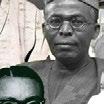











Spread Half Page N1, 300, 000
Double Spread N1, 550, 000

Double Spread Half Page N1, 200, 000
10X6 N700, 000
10X5 N650, 000
10X4 N600, 000
10X3 N500, 000
9X6 N440, 000
9X5 N395, 000
9X4 N335, 000
9X3 N310, 000

8X6 N410, 000

8X5 N380, 000
7X5 N320, 000






7X4 N315, 000

6X5 N280, 000

6X3 N145, 000
6X2 N85, 000
5X2 N70, 000
4X4 N160, 000
4X3 N95, 000
4X2 N65, 000
3X3 N60, 000
3X2 N50, 000
2X2 N30, 000
2X1 N15, 000 1X1 N7, 000
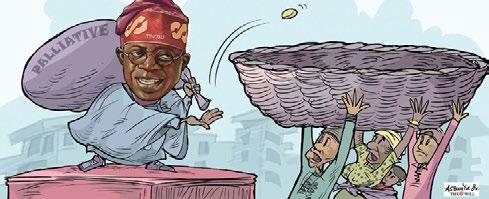
























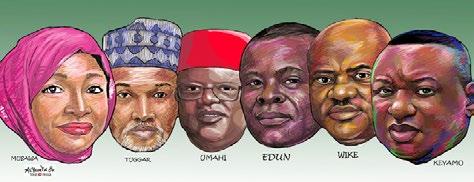

The Joint Admissions and Matriculation Board, JAMB, last week released the statistical breakdown of the 2025 Unified Tertiary Matriculation Examination, UTME. The result showed a disappointing performance that revealed a deep rot in the educational system at the secondary level. But first, the haunting statistics. According to the board, analysis of candidates’ performance records showed that over 1.5 million candidates scored below 200. The records showed that a dismal 12,414 candidates, representing 0.63 per cent of the total 1,955,069 candidates who sat for the examination, scored 300 and above. Of this group, 4,756 candidates representing 0.24 per cent scored 320 and above, while 7,658, representing 0.39 per cent scored between 300 and 319. In stark contrast, 983,187 candidates, or 50.29 per cent, fell within the 160–199 score range, the threshold typically considered the minimum cut-off for admission into tertiary institutions. According to JAMB, another 334,560 candidates, representing 17.11 per cent scored between 200 and 249, positioning them in the moderate performance bracket. Among over 550,000 candidates who scored below 160, about 488,197 candidates (24.97 per cent fell within the 140–159 range, while 57,419, representing 2.94
percent, scored between 120 and 139. A total of 5,851 candidates, representing just 0.30 per cent, scored below 120, with 2,031 scoring under 100.
What readily comes from these figures is a reflection of the structural and infrastructural challenges facing the education sector generally. Firstly, JAMB itself has been progressively lowering the bar in the cut-off marks for admission, despite stiff opposition from Vice-Chancellors. In the first instance, it reduced the mark to 200, then 180 and 140 out of 400 for universities and 100 for polytechnics. Was this reduction aimed to encourage competence and merit or entrench mediocrity?
What is even amazing is the reaction of the Minister of Education, Dr.Tunji Alausa, to the recent JAMB statistics. According to him, the statistics show that anti-malpractice measures are working.
“That’s a big concern and a reflection of exams being done the proper way. JAMB conducts its exams, using a computer-based testing system. They’ve implemented strong security measures, and as a result, fraud or cheating has been completely eliminated. Unfortunately, we cannot say the same for WAEC and NECO.”
For him, the introduction of computerbased testing system would be introduced to WAEC and NECO exams soon.

The deplorable state of public schools in many states of the federation leaves much to be desired. Poor equipment, overcrowding and a dubious admission process are some of the problems. Then there is poor pay, poor staffing and a lack of modern instructional materials, training or technology required to deliver 21stcentury education, particularly in the age of AI
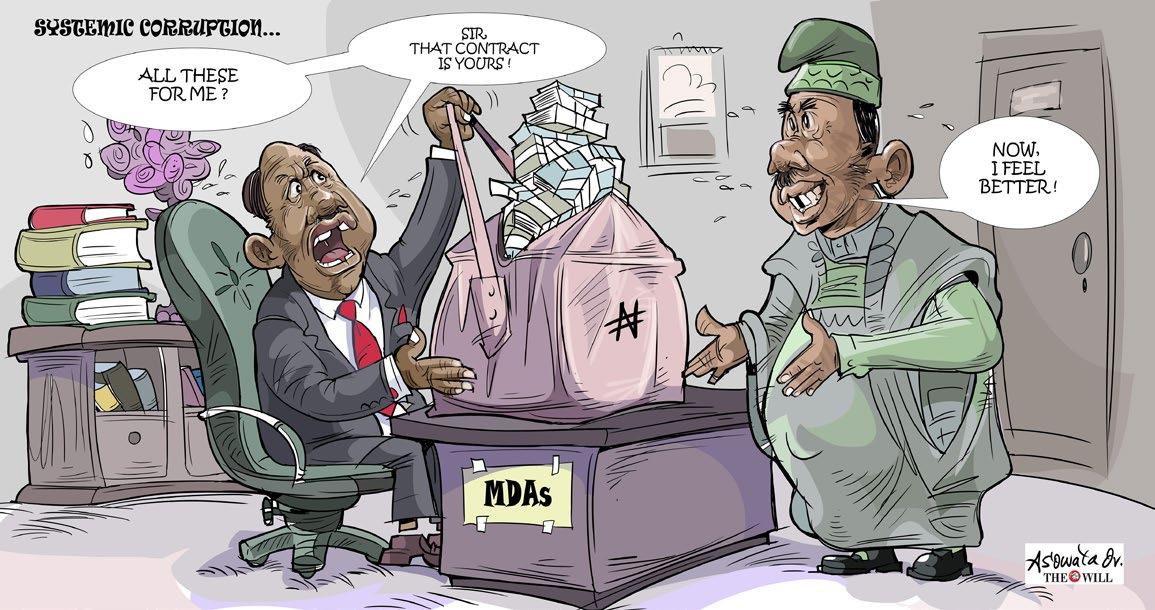
NIGERIA BUREAU: 36AA Remi Fani-Kayode Avenue, GRA, Ikeja. Lagos, Nigeria. info@thewillnews.com +234 810 345 2286, +234 913 333 3888 @THEWILLNG



BY DAMILOLA ADENIRAN
Since the creation of Ekiti State on October 1, 1996, various administrations have been focused on achieving rapid socio-economic development. The quest for development was undoubtedly a fundamental factor driving the calls for the state’s creation. This is understandable, given the historical context: the old Ondo State was dominated by the Ondo clan, while Ekitis were marginalized from governance.
Governor Biodun Oyebanji assumed office at a time when order and efficiency in governance were crucial for Ekiti State. The state is often characterized as an “agrarian state,” reflecting its rural agricultural lifestyle, subsistence farming system, and historical political decentralization. In this context, agriculture and trade have long been intertwined, with men typically cultivating crops like yams, cassava and cocoa, while women played a vital role in trading these crops on designated market days. Ekitis are renowned for their academic excellence and upright decision-making, traits that align with the state’s reputation as one of the most literate communities in Nigeria. However, the state’s economy faced an uncertain future, with concerns about its meager resources and corporate existence from the outset. To address this, Oyebanji prioritized revamping the battered economy, recognizing that enhancing the living standards of the people requires a multifaceted approach. A key aspect of his strategy involves building relationships with critical stakeholders, which some perceive as “political diplomacy.” His approach stresses the significance of stakeholder engagement and diplomacy in governance.
This approach is guided by the philosophy of ‘Consolidate old friendships, Win new ones, and Repair damaged relations,’ underpinned by the logic that collective effort can foster a brighter future for Ekiti and its people. By fostering relationships with various groups, the administration can better address the state’s challenges and promote inclusive development.
Oyebanji is laying a solid foundation for an ideal state that embodies equal opportunities for all citizens, irrespective of their social status, economic well-being, religious beliefs or ethnic affiliations. This vision acknowledges that conflicts may arise if individuals are not afforded diverse incentives and opportunities that cater for their unique skills and abilities. However, this approach diverges from the conservative stance of theopposition, thereby highlighting a distinct philosophical underpinning of governance.
As enshrined in the 1999 Constitution (as amended), the welfare of the people is a major priority for state policies, programmes and

decisions. Oyebanji adheres to this principle, making it a guiding doctrine by ensuring that his actions and decisions are geared towards improving the living standards of the Ekitis.
BAO, as Oyebanji is fondly called, can not only be classified as the author of modern Ekiti state, governing with civility and humanity, but also as a champion of a classless and egalitarian structure in governance. He embodies values and traits like intellectual capacity, honesty, and integrity, making him stand tall among his contemporaries.
The governor identified two critical issues that could inform the assessment of his administration’s policies and programmes: poverty eradication and improved food security. Given Ekiti State’s agrarian economy, where rural poverty often precipitates urban misery, his focus should be on the agricultural sector. Specifically, employment generation in agriculture should be the cornerstone of the administration’s poverty alleviation efforts.
Poverty breeds criminality, impoverishes the masses, and perpetuates underdevelopment, even among the privileged class, while also leading to land alienation. In a poor society, even the wealthy live in fear, often barricading themselves indoors, vulnerable to armed robbery. Moreover, a poor state fosters an unhealthy business environment and it’s often a breeding ground for corruption. Poverty is a pervasive issue in Africa, with deep historical roots in sub-Saharan Africa, where it appears to defy conventional solutions.
REGARDLESS
OF
ONE’S PERSPECTIVE ON BAO’S ADMINISTRATION, IT IS EVIDENT THAT HE ENVISIONED HIS ROLE AS A TRANSFORMATIVE LEADER FOR EKITI STATE
When access to economic opportunities is monopolized by a few, honest means of making a living become closely tied to escaping poverty. Often viewed as a vicious cycle, escaping poverty requires extraordinary efforts. Its persistence is attributed to unequal wealth distribution and the multiplicity of human needs. Thankfully, Ekiti State’s approach to poverty alleviation and eradication is exemplary and unparalleled. For this, BAO deserves the highest accolades.
In his work “Politics”, Aristotle, an ancient philosopher, posited that the state’s purpose is to foster “the good life, equity, and the common good.” While alleviating poverty is crucial, ensuring its permanent alleviation is a distinct challenge. This underscores the importance of sustainability in poverty alleviation measures, beyond just their implementation. For
BY IKHIDE ERASMUS
Captain Ibrahim Traoré, President of Burkina Faso, is not just an African soldier—he is a PanAfricanist, a revolutionary icon and a champion of African liberation struggles. His pro-people, Africa-centered policies have earned him admiration across the continent. Yet, like many before him, he now faces threats of elimination from bloodthirsty imperialists using familiar tactics: interfering in African governance under the guise of rescuing the people from misrule.
Recently, U.S. General Michael Langley of AFRICOM appeared before the U.S. Senate, accusing Traoré of hoarding his nation’s gold for personal enrichment. This accusation smacks of propaganda, painting the general as an agent of destruction, furthering the West’s longstanding agenda to loot Africa’s mineral wealth.
Conspicuously absent from Langley’s remarks were mentions of Traoré’s transformative policies— free education from primary to tertiary levels, a nationwide housing initiative, and universal healthcare. By ignoring these milestones, the general trivializes Africa’s struggle against the farce of Western-imposed democracy that often serves external interests rather than local development.
Fortunately, Burkinabes and other Africans are no longer silent. They are warning Western powers to stop exploiting and degrading the continent, as they have done for centuries. Traoré—dubbed by many as *”The Conscience of African Libertinism”* and arguably one of Africa’s most progressive leaders today—will not cower before bullets from Washington or Paris.
The goal of this imperialist smear campaign is simple: derail Traoré’s developmental vision for Burkina Faso and his pan-African ideals aimed at freeing the continent from the shackles of neo-colonialism and imperialism—what many describe as the final phase of colonial oppression. Africans and their allies globally see through these ploys. Western media platforms have become tools for vilifying Traoré in the eyes of the international community. But the tide is turning. Africans are no longer deceived by these familiar tactics—especially in the twilight of the 21st century, when the West continues to cling to its nihilistic
tendencies instead of learning from its blood-soaked history on African soil.
This imperialist script is old. Dr. Patrice Lumumba, the Democratic Republic of Congo’s first Prime Minister, was assassinated in 1961, with CIA involvement widely alleged. Togo’s first President, Sylvanus Olympio, was killed in 1963 after rejecting the CFA franc, with both U.S. and French complicity suspected.
Guinea-Bissau’s Amílcar Cabral was assassinated in 1973, while Libya’s Muammar Gaddafi was brutally murdered in 2011, his dream of African unity cut short by Western intervention. The tragic ending of Félix Moumié of Cameroon, poisoned in 1960 by a French agent, and Ruben Um Nyobè, killed in 1958 by French-led counter-insurgency forces, are further reminders of this pattern.
Likewise, Mehdi Ben Barka of Morocco, a prominent socialist and opponent of King Hassan II, disappeared in Paris in 1965, allegedly kidnapped, tortured, and killed by Moroccan intelligence with French and Israeli collusion. Pierre Mulele of DR Congo suffered a brutal fate in 1968, when the Mobutu regime—with Western backing—executed him in gruesome fashion. Eduardo Mondlane of Mozambique, a liberation leader, was assassinated in 1969 by a parcel bomb in Dar es Salaam, likely planted by Portuguese secret police or rivals within FRELIMO.
AFRICANS ARE NO LONGER DECEIVED BY THESE FAMILIAR TACTICS—ESPECIALLY IN THE TWILIGHT OF THE 21ST CENTURY, WHEN THE WEST CONTINUES TO CLING TO ITS NIHILISTIC TENDENCIES INSTEAD OF LEARNING FROM ITS BLOOD-SOAKED HISTORY ON AFRICAN SOIL
These names are more than history—they are warnings.
General Langley’s statement mirrors the same colonial arrogance that defined America’s foreign policy under President Barack Obama, whose administration oversaw the destruction of Libya. Like Obama, Langley appears to be following orders from the U.S. military-industrial complex, which builds weapons not for deterrence, but for destruction—often on African soil, as seen in Libya and potentially again in Burkina Faso.
AFRICOM, under any name or disguise, has no business in Africa— except to serve America’s deluded role as a global policeman and self-anointed guardian of democracy. Its presence is not about African stability, but about safeguarding Western interests at the expense of African lives and sovereignty.
•Erasmus contributed this piece via: ikhideluckyerasmus@ gmail.com
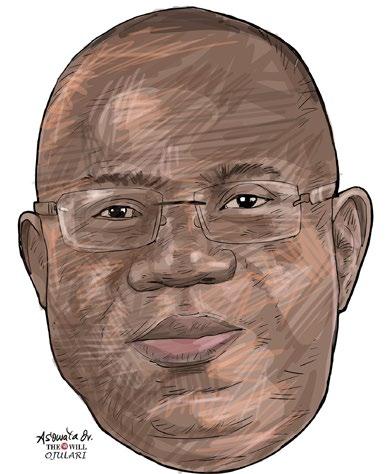
With the new management team recently constituted by President Bola Tinubu for the behemoth Nigeria National Petroleum Company Limited (NNPCL) in place, one fact is certain: The unending maintenance of the nation’s four refineries will now come to a halt. There will also emerge a group of state facilities that would snowball into the status of national relics. Perhaps what would quicken the transformation could be the outcome of the investigation into the affairs of the behemoth national oil company that is widely believed to be the cesspool of corruption.
Recently, an economist and energy sector analyst, Kelvin Emmanuel, stated that the NNPCL’s refineries are idle and that Dangote Refinery is currently the only facility in Nigeria genuinely producing Premium Motor Spirit (PMS), commonly referred to as petrol.
Emmanuel made the claim while speaking during the Morning Brief program on Channels Television on May 6, 2025.
He dismissed the government’s narrative around the rejuvenation of state-owned refineries, arguing that they are either non-functional or engaging in mere blending operations, not actual refining of PMS. His words: “I’ve always said it, and I stand by it: the only refinery in Nigeria producing PMS is Dangote. Dangote is doing 44 million liters of PMS on a daily basis.
“In contrast, NNPC is not refining PMS – they are only blending,” he added. “Warri has a catalytic reforming unit, but Warri’s catalytic reforming unit is not functional.
“So, you can’t actually refine PMS. You can produce naphtha, but you can’t break it into higher distillates like PMS. The same thing applies in Port Harcourt.” He added that data from the Nigerian Midstream and Downstream Petroleum Regulatory Authority (NMDPRA) supports his claims, showing that the state-run refineries are not producing petrol.
“What they were doing was they barge C5 raciness to the refinery, blend with NAFTA, condense it and call it PMS,” Emmanuel explained.
EDITOR Sam Diala
Lafarge Africa Plc Shareholders Celebrate
BUA Foods Plc’s earnings in Q1 2025 were the highest in the history of the 37-yearold company, with a net profit after tax of N125.28 billion, representing a 124 percent increase from N55.82 billion in the same period of 2024.
This reflects the growth trajectory in its pretax profit which went up by 118.69 percent amounting to N136.38 billion in the review period from the relatively meagre N62.36 billion in Q1 2024.
The foremost consumer goods firm’s revenue haul also rose significantly to N442.06 billion from N335.92 billion in the corresponding period constituting a 24 percent increase.
BUA Foods’ impressive earnings surge was driven by strong growth in flour, pasta, and rice sales, showcasing effective management and marketing strategies to cope with the mounting headwinds that underline the industry, especially in a high inflationary environment.
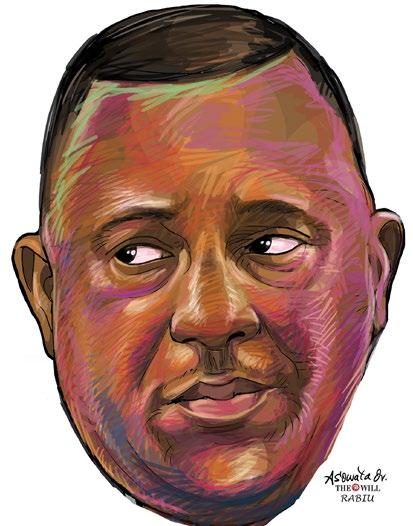
Specifically, flour revenue soared by 145 percent, while rice revenue increased at a remarkable 1617 percent. The company also saw a 12 percent increase in pasta revenue. While sugar sales saw a slight decrease, the overall revenue and profit growth were substantial.
The impact of the challenging macroeconomic environment on the manufacturing sector reflected in the Q1 2025 BUA Foods’ total operating expenses which climbed to N22.39 billion, while in Q1 2024, they were N14.37 billion. The 56 percent increase in operating expenses was primarily driven by higher selling and distribution expenses (up 13 percent to N11.08 billion) and administrative expenses (up 147 percent to N11.32 billion). The firm’s corporate existence was not alienated from the general inflationary environment sparked by the high cost of energy and the impact of the over 70 percent devaluation of the naira in June 2023.
Using key ratios for measuring the performance of a manufacturing company, BUA Foods stands on a good footing and shows significant improvement, according to data from its Q1 2024 performance.
The firm achieved a strong Return on Assets (RAO) with its total assets increasing to N1.14 trillion in Q1 2025 against N1.09 trillion in the preceding period, representing an increase of 4.3 percent -- indicating a good asset utilisation and profitability during the period.
Emmanuel outlined the production capacities of Nigeria’s major refineries – Port Harcourt (60,000 and 150,000 barrels per day in the old and new units, respectively), Warri (125,000), and Kaduna (110,000) – but insisted none of them is actively refining PMS. He noted that Kaduna Refinery has two Crude Distillation Units (CDUs), CDU1 and CDU2, with capacities of 50,000 and 60,000 Continues on page 35
A significant increase of 62.77 percent was also achieved in Return on Equity (ROE) in the first three months of the year compared with 18.3 percent recorded in the equivalent period of 2024.
This ratio shows the efficiency in how the company is using its capital (debt and equity) to generate profits -- providing a comprehensive view of the profitability
the sharp drop in finance costs from N15.15 billion in Q1 2024 to N3.76 billion in the review period, constituting a 75 percent increase.
The negative record of N27.28 billion in foreign exchange loss in Q1 2024 reversed to N485.8 million contributing to the strong profit growth that also boosted the Earnings Per Share (EPS) to 6.96 from 3.10 in the corresponding period.
“It was quite an impressive performance when you consider the unfavourable macroeconomic environment in which the manufacturing sector is subjected to. management policies that must have helped the firm to achieve such a significant growth at a time like this,” said Dr Kene Odenigbo, an economist.
The firm achieved a strong Return on Assets (RAO) with its total assets increasing to N1.14 trillion in Q1 2025 against N1.09 trillion in the preceding period, representing an increase of 4.3 percent -- indicating a good asset utilisation and profitability during the period




Continues from page 34 strategies and higher sales volumes.
While the company did not explicitly state how many times prices were increased, the data indicates a notable increase in revenue and profitability, suggesting that price adjustments were indeed implemented.
Analysts believe that BUA Foods’ FY 2024 audited reports indicate that the company adjusted prices to capitalise on revenue growth and higher sales volumes, particularly for flour and pasta products. Additionally, the company attributed a portion of its revenue growth to optimised pricing strategies.
BUA Foods is currently the second most valuable stock on the Nigerian Exchange (NGX) with a market capitalization of N7.52 trillion, which is about 11 percent of the entire Nigerian Exchange equity market.
BUA Foods closed its last trading day (Friday, May 9, 2025) at N418.00 per share on the NGX. The stock began the year with a share price of N415.00 and has since gained 0.72 percent on that price valuation.
It has traded a total volume of 2.76 million shares—in 4,377 deals—valued at N1.05 billion over the period, with an average of 43,760 traded shares per session. A volume high of 706,309 was achieved on February 19th, and a low of 1,793 on March 26th, for the same period.
BUA Foods has won multiple awards, including the “Company of the Year” award at the CNBC Africa Business Leaders Awards. They have also received recognition for their contributions to Corporate Social Responsibility (CSR). BUA Foods was also named the “Most Outstanding Manufacturing Conglomerate” and “Most Outstanding Manufacturing Conglomerate in CSR” at the 2021 Brandcom Awards. The company emerged as the 2024 Company of the Year at the prestigious CNBC’s Africa All Africa Business Leaders Awards (AABLA) held in South Africa.
This historic win makes BUA Foods the first Nigerian
organisation to win the Company of the Year award in the 12year history of AABLA, Africa’s largest premier business award renowned for recognising outstanding achievers in Africa’s business landscape.
Continues from page 34
barrels per day, respectively. Despite this, refining remains at a standstill. “The government-owned refineries are not doing what they are supposed to do,” he stated.

Lafarge Africa Plc successfully held its 66th Annual General Meeting (AGM) in Lagos recently during which its members applauded the company’s impressive performance in the FY 2024.
The AGM, attended by shareholders, board members, and stakeholders, reviewed the company’s exceptional 2024 financial results which set the stage for accelerated growth in the forthcoming years.
In the 2024 financial result released in February, Lafarge Africa announced a remarkable revenue of N696.76 billion for the 2024 financial year. The growth in revenue represents an increase of 72 percent from N405.50 billion recorded in 2023.
Operating profit grew by 89 per cent from N102 billion in 2023 to N193 billion in 2024 while Profit after tax surged to N100 billion from N51 billion, representing an increase of 96 percent over 2023.
During the AGM, shareholders approved a final dividend of N1.20 kobo per share, reinforcing the company’s commitment to delivering value.
The recent agreement by Holcim Group to sell its 83.81 percent stake in Lafarge Africa to Huaxin Cement Ltd was also acknowledged, marking a pivotal step toward future expansion and innovation.
Addressing shareholders at the AGM, Chairman Lafarge Africa Plc, Gbenga Oyebode MFR, said that the success recorded in the 2024 financial year reflects the shared vision and trust of the company’s shareholders.
“Today’s AGM reflects the strength of our

The award came hours before BUA Foods was named the “Most Valuable Indigenous Food Company” at the 2024 BrandCom Award in Lagos State. In late September 2024, Marketing Edge also awarded BUA Foods as the “Customercentric FMCG Corporate Brand of the Year” while Media Consortium named IRS Premium Wheat Flour the “Premium Brand of the Year”.
Nigeria’s manufacturing sector has been lamenting over the harsh operating environment that impacts severely on the activities of the operating firms. Last week, the Manufacturers Association of Nigeria (MAN) decried the worsening condition of manufacturing in Nigeria’s economy as the sector delivered a 1.38 per cent growth in 2024.
The Director-General of MAN, Mr Segun Ajayi-Kadir, speaking during a business luncheon organised on Thursday by the Apapa Branch of the MAN in Lagos, said in spite of the current macroeconomic realities plaguing global business operations, manufacturers must aim to exceed expectations.
“An internal survey by MAN reports that unsold inventory rose sharply from N1.1 trillion in 2023 to N2.1 trillion in 2024.
“You can imagine a subsector or a sector, depending on how you look at it, having two trillion worth of unsold inventory.
“Additionally, challenges related to transport and logistics, infrastructure, particularly around major ports and industrial corridors, make the operating environment unconducive for manufacturing.
“The impact of these challenges is evident in the sector’s capacity utilisation and its contribution to GDP , which have hovered around 5.5 per cent and 10 per cent respectively, over the past 12 months,” he said.
Beyond refining capacity, Emmanuel criticized the federal government for lacking a proper hydrocarbon accounting framework. This, he argued, has led to a gross underestimation – or outright misreporting – of crude oil production volumes and revenue allocation. “I’ll say that the Nigerian government today does not have an accurate estimate of the amount of crude oil that comes to surface, “Nigeria is one of the few crude oil-producing countries in the world without a hydrocarbon accounting framework.”
He explained that such a framework would allow agencies like the Ministry of Finance and Ministry of Petroleum Resources to independently verify production volumes and government entitlements in real-time. Emmanuel referenced the controversial $450 million raised by a firm licensed to operate in Nigeria, which was given crude oil by the NNPC as an upfront payment to fund refinery maintenance. He questioned the logic behind investing heavily in turnaround maintenance rather than building a new refinery altogether.
According to him, the money approved by the Federal Executive Council (FEC) in 2021 for turnaround maintenance was enough to build a brand-new refinery. The Dangote Refinery has started importing crude oil to meet its refining requirement as it has since commenced the export of refined petroleum products.
By this development it will become clearer to the world that the huge resources invested in the endless maintenance of the idle refineries would have gone into the drains. It is doubtful if the present government would continue in the endless maintenance of the refineries which has been a goldmine for top government officials
As one industry analyst put it, “the refineries have not been working. What we have seen is a pattern of public deception, financial mismanagement and media manipulation.”
The Senate is yet to publish the report of its special committee constituted on October 24, 2023 to investigate all the contracts awarded for the rehabilitation of all state-owned refineries said to have gulped N11.35 trillion in 13 years.
shared vision and the trust of our shareholders.
“Our remarkable performance amidst the economic headwinds underscores our commitment to excellence and sustainable growth.
“We are well positioned to drive sustainable growth, empower communities, and shape Nigeria’s infrastructure for generations to come,” he said.
Also speaking at the event, the Group Managing Director/Chief Executive Officer, Lafarge Africa Plc, Lolu Alade-Akinyemi, stated, “Our 66th AGM celebrates a year of remarkable achievements spurred by innovation and sustainability.
“Achieving 76 percent revenue growth in the face of economic challenges attests to our dedication and strategic focus.
“We remain committed to innovation, sustainability, operational excellence, and delivering superior value to our stakeholders.”
Mr. Eric Akinduro, Chairman of the Ibadan Zone Shareholders’ Association, ratifying the outcome of the AGM, remarked: “This is indeed a remarkable time for the shareholders of Lafarge Africa Plc, owing to the commitment, discipline, dedication, and professionalism demonstrated by the leadership of the organization.
“The profit declared demonstrates that Nigerians can achieve excellence when given an enabling environment.
“With the current trajectory, I am confident that the company’s financial performance will continue to improve year after year.”
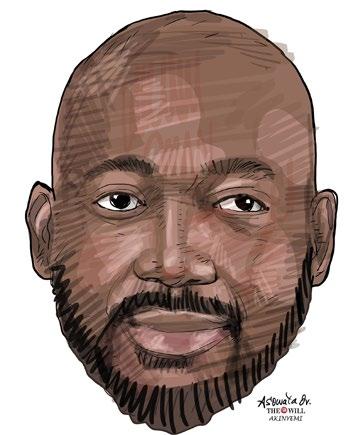
“Lafarge Africa continues to prioritize sustainable practices, with initiatives aimed at reducing carbon emission and accelerating green growth.
“This is highlighted by the company’s adoption of calcined clay in cement production, ecofriendly products, and the expansion of its green logistics framework.”
The company is reputed as a leading innovative and sustainable building solutions company and manufacturer of a range of cement brands.
THEWILL recalls that Holcim Group in December 2024 announced that it had signed an agreement with Huaxin Cement, Hong Kong, to sell its shareholding in Lafarge Africa Plc, listed

on the Nigeria Exchange Limited (NGX).
In a letter notifying the exchange and investing public of the transaction, Mr. Adewunmi Alode, Company Secretary of Lafarge Africa, stated that Caricement and Associated International Cement Limited, the largest shareholders in Lafarge Africa, had reached an agreement with Hainan Huaxin Pan-Africa Investment Co. Limited and Huaxin (Hong Kong) International Holdings Limited -- part of Huaxin Cement.
Through this transaction, Huaxin Cement will acquire full ownership of Caricement and a second entity, Davis Peak Holdings Limited, which will hold the shares currently held by Associated International Cement Limited (AICL)).
According to the statement, upon completion, the Huaxin Cement entities will hold a combined 83.81 percent shareholding in Lafarge Africa Plc.
Following completion, Lafarge Africa Plc will remain listed on NGX, and, subject to regulatory approvals, Huaxin Cement intends to launch a mandatory takeover offer in compliance with applicable laws and regulations.
The company disclosed that the development was part of the key issues discussed and concluded at the emergency meeting of the board of Lafarge Africa Plc, held on Saturday, November 30th, 2024.
Lafarge Africa Plc is one of Nigeria’s major cement manufacturing companies, with significant plants in Ogun and Cross River states. It has advocated for sustainability in its operations, emphasising clean energy for production.

BY VINCENT NWANMA
The recent handling of Nigeria’s nairafor-crude oil sales to local refineries has brought long-standing gaps in the nation’s economic planning into sharp relief. The under-utilisation of domestic crude as a tool for sustainable growth and the lack of clear integration of the oil sector with broader national development have limited Nigeria’s economic progress.
As the initial six-month naira-for-crude arrangement between NNPCL and local refineries like Dangote approached its March 2025 expiration, uncertainty over its future highlighted the urgent need for coherent, pragmatic policies. The government’s decision to extend the scheme, following public concern, underscores both the challenges and the opportunities for leveraging Nigeria’s oil resources more effectively to drive inclusive growth.
At its core, the naira-for-crude initiative was designed to enable local refineries to purchase Nigerian crude oil in the local currency, thus supporting domestic refining, reducing pressure on foreign exchange reserves, and potentially stabilising fuel prices.
The Dangote Refinery, with its world-class capacity, stands as a symbol of Nigeria’s ambition to shift from an exporter of raw crude to a producer of refined petroleum products. However, the initial trial period and subsequent policy ambiguity exposed the risks of ad-hoc economic management in such a vital sector.
Despite oil’s dominance in Nigeria’s export earnings, its contribution to gross domestic product (GDP) remains surprisingly modest. Recent data from the National Bureau of Statistics (NBS) show that the oil sector accounted for just 4.6 percent of GDP in the fourth quarter of 2024, while the non-oil sector contributed over 95 percent.
This disconnect highlights a structural weakness: Nigeria’s inability to fully integrate its oil wealth into the broader economy, thereby limiting the sector’s multiplier effects on industrialisation, job creation, and fiscal stability.
The persistent reliance on imported petroleum products has compounded these challenges. Even after the removal of fuel subsidies in 2023, which halved domestic petrol consumption, Nigeria’s import bill for petroleum products remains substantial, with N2.63 trillion spent on petrol imports in the first quarter of 2024 alone.
The resultant strain on foreign reserves and the naira underscores the urgency of boosting local refining capacity – not just for economic efficiency, but for national energy security.
The Dangote Refinery, which began full operations in 2024, offers a promising solution. With a projected capacity of 650,000 barrels
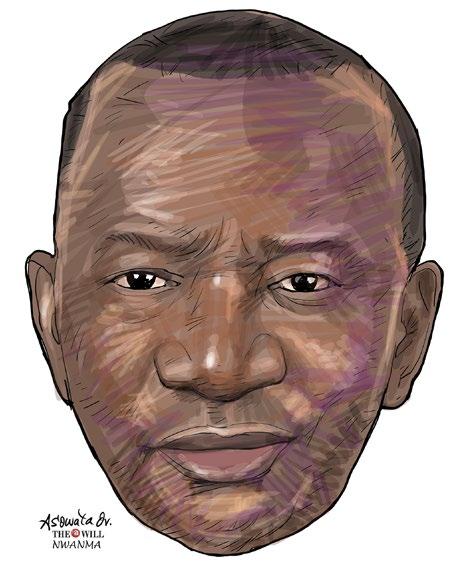
per day, it is poised to meet domestic demand, reduce the need for imports, and save the country billions of dollars annually. Moreover, the refinery is expected to create at least 100,000 jobs, stimulate allied industries, and ease pressure on the naira by reducing the demand for foreign exchange to import fuel.
These benefits, however, hinge on a stable and transparent policy framework that guarantees domestic crude supply to local refineries at competitive terms.
Nigeria’s experience is not unique. Across Africa, several oil-producing nations have recognised the value of integrating crude oil production with domestic refining and local content development.
Angola, for instance, has embarked on an ambitious programme to expand its refining capacity, with the Cabinda refinery set to launch in 2025 as part of a broader strategy to reduce fuel imports and retain value within the economy.
Ghana, facing similar challenges, has announced plans to build three new refineries and five petrochemical plants, aiming to transform itself into a regional energy hub and diversify its industrial base.
Namibia has approved a comprehensive local content policy for its burgeoning oil sector, ensuring that the benefits of resource extraction are broadly shared through employment and business opportunities for citizens.
These examples illustrate the importance of clear policy direction, robust institutional frameworks, and a commitment to local value addition. For Nigeria, the path forward requires moving beyond short-term fixes and embracing a holistic strategy that aligns the oil sector with national development goals.

The Dangote Refinery, with its world-class capacity, stands as a symbol of Nigeria’s ambition to shift from an exporter of raw crude to a producer of refined petroleum products
This includes institutionalising the allocation of crude oil to domestic refineries, strengthening local content requirements, and investing in infrastructure and technology to support efficient refining and distribution.
Furthermore, oil revenues must be channelled into productive sectors such as agriculture, manufacturing, and services to drive diversification and inclusive growth. Transparent governance, regular stakeholder engagement, and adaptive policy mechanisms are essential to building investor confidence and ensuring that the gains from domestic refining are widely shared.

The extension of Nigeria’s naira-for-crude oil sales scheme is a pragmatic step toward harnessing the nation’s oil wealth for development, but it also highlights the pressing need for a more strategic and integrated approach to resource management.
While the move averted immediate disruption, it also underscored the need for a more strategic, integrated approach to resource management. Drawing on lessons from other African countries, clear policies, strong local content frameworks, and deliberate efforts to link oil production with domestic value addition can transform oil wealth into broad-based prosperity. Nigeria now stands at a crossroads: by institutionalising domestic crude allocation, strengthening local participation, and investing in infrastructure, the country can unlock the full potential of its oil sector. Ultimately, sustained political will and coherent policymaking are essential for turning Nigeria’s oil resources from a source of vulnerability into a foundation for inclusive and sustainable growth.
•Nwanma is an analyst, researcher and expert in business journalism.
Photo Editor: Peace Udugba [08033050729]
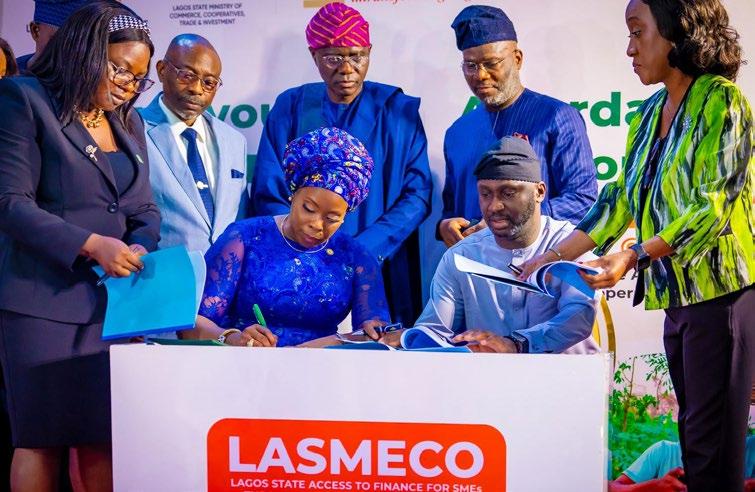
Lagos State Commissioner for Commerce, Cooperatives, Trade & Investment, Mrs. Folashade Ambrose-Medebem (l) and Managing Director/CEO, Bank of Industry, BOI, Dr. Olasupo Olusi, signing a Memorandum of Understanding. Behind them: Governor of Lagos State, Mr. Babajide Sanwo-Olu, flanked by Executive Director, Commercial & Institutional Banking, Sterling Bank, Mr. Tunde Adeola (r) and Attorney General/Commissioner for Justice, Mr. Lawal Pedro, SAN (l), during the unveiling of Lagos State Government (LASG)-Bank of Industry (BOI)-Sterling Bank MSME Fund and signing of the MoU between (LASG) and BOI, at the Adeyemi Bero Multipurpose Hall, Alausa, Ikeja, on May 7, 2025.
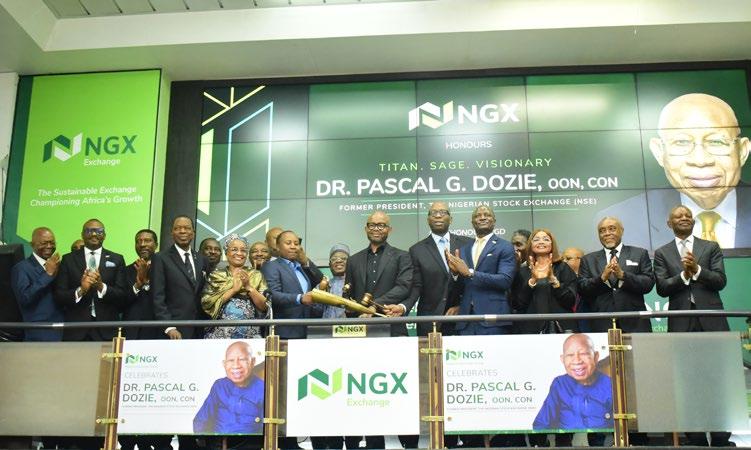
Gabriel Idahosa, president and chairman of Council, LCCI; Jude Chiemeka, CEO, Nigerian Exchange Limited (NGX); Oscar Onyema, immediate past Group CEO, Nigerian Exchange Group (NGX Group); Raymond Obieri, Past President of Council, NSE; Fatima Wali-Abdurrahman, Director, NGX Group; Niyi Yusuf, Chairman, NESG; Chidi Dozie, Grandson of late Pascal Dozie; Alhaji (Dr) Umaru Kwairanga, Group Chairman, NGX Group; Uzoma Dozie, and Kelechi Dozie, both Sons of late Pascal Dozie; Temi Popoola, GMD/CEO, NGX Group; Olufemi Akinsanya, Chairman, NGX RegCo; Elizabeth Ebi, GMD/CEO, Futureview Financial Services Ltd; Emmanuel Ikazoboh, former Interim Administrator, NSE; and Frank Aigbogun, Publisher, BusinessDay, during an afternoon of tributes and special closing gong ceremony in honour of Pascal Dozie, in Lagos, recently.
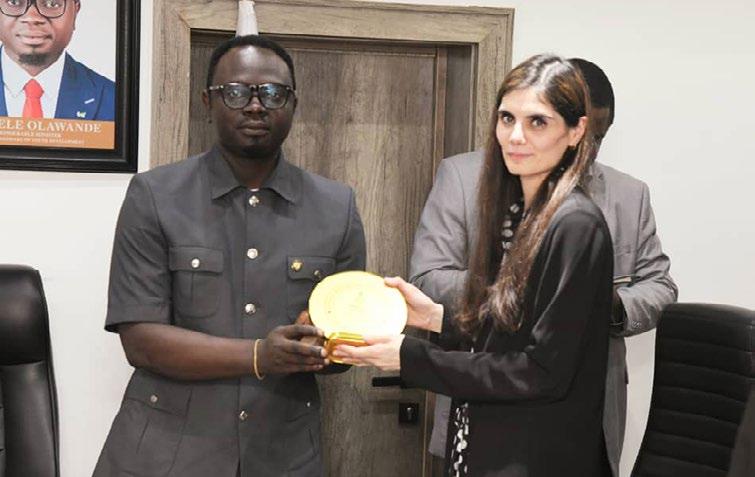
Minister of Youth Development, Comrade Ayodele Olawande (l), presenting a souvenir to the leader delegation, Tanya Singh, during the visit of a delegation from Google to the Minister’s office in Abuja on May 9, 2025.
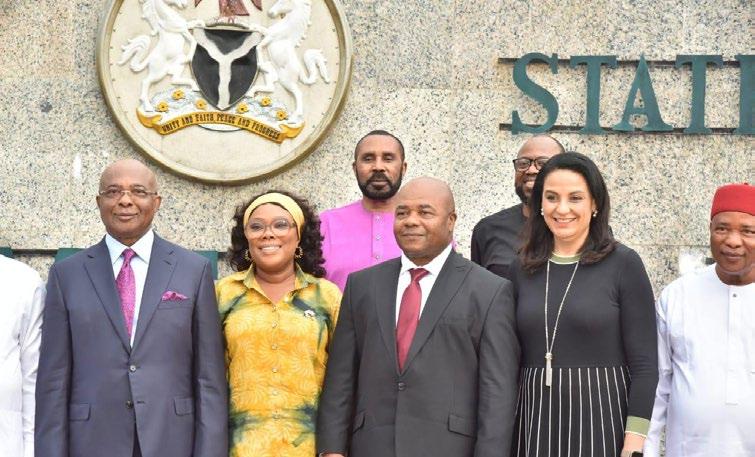
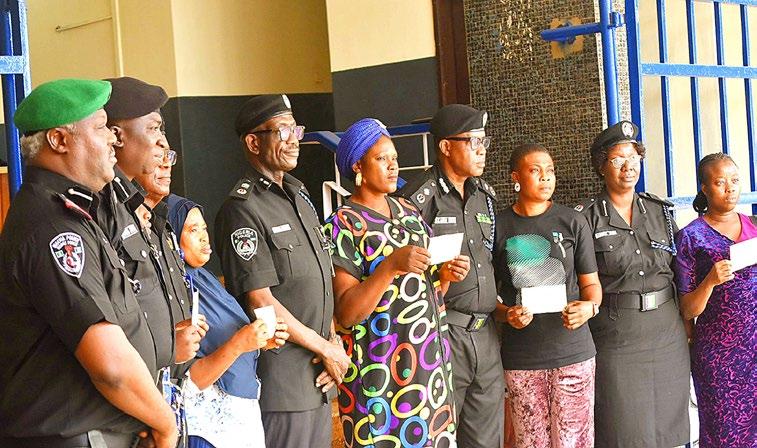
Commissioner for Police, Oyo State, Johnson Adenola (4th l) with other members of the management team of Police Command, Oyo State and relatives of the deceased officers of Nigerian
Force at the presentation of cheques in Ibadan on May 6, 2025.
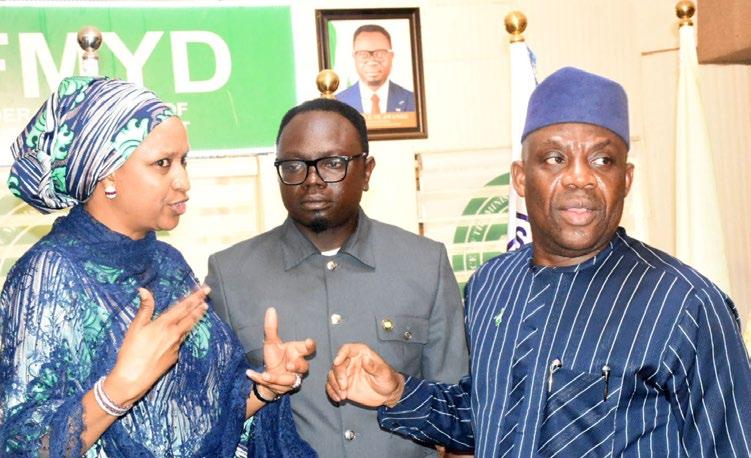
L-R: Special Adviser to the President on Policy and Coordination, Hadiza Bala-Usman; Minister of Youth Development, Comrade Ayodele Olawand and Minister of Education, Dr. Tunji Alausa, during the inauguration of the committee on repositioning the National Youth Service Corps (NYSC) for national development, employability, and legislative alignment in Abuja on May 6, 2025.





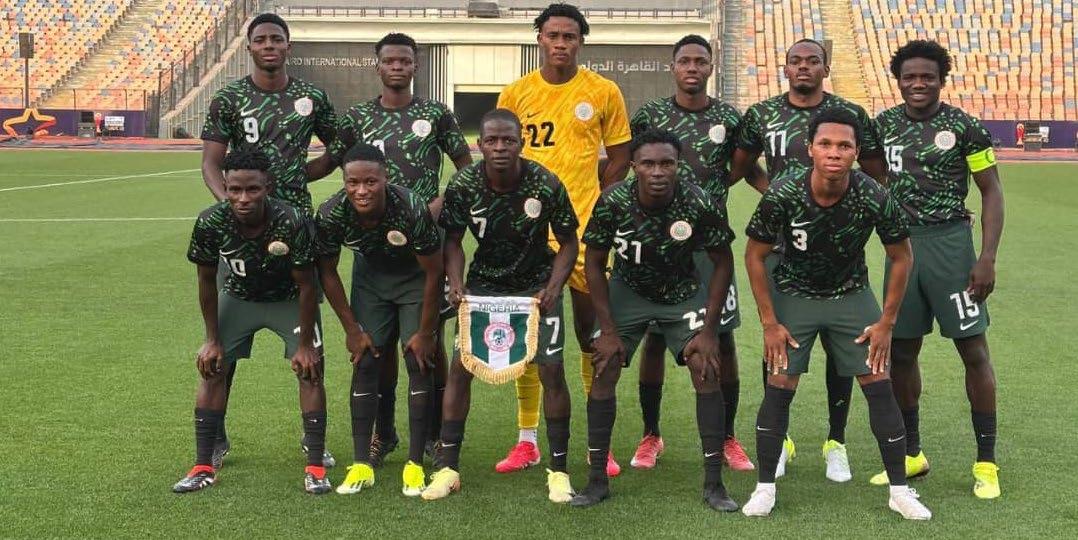
BY JUDE OBAFEMI
Nigeria’s Flying Eagles entered the 2025 TotalEnergies CAF Under-20 Africa Cup of Nations Competition in Egypt with measured confidence and a clear goal: to reclaim continental authority and reach the FIFA U-20 World Cup in Chile. With a record seven U-20 AFCON titles to their name, expectations surrounding the team were expectedly high. Their performance in Group B has now met the first major requirement of the campaign: qualification for the knockout stage. A 2-2 draw with Kenya in their final group match was enough to see Nigeria through to the quarter-finals, where they will face Group C winners Senegal.
The competition began on April 27 and is scheduled to conclude on May 18. Nigeria opened their campaign with a narrow but well-earned 1-0 victory over Tunisia. Auwal Ibrahim provided the only goal of the match in the first half, and it stood until the final whistle. That performance reflected a disciplined start, and though the margin was slim, the outcome gave the team a platform on which to build.
The following match on May 4 offered a much sterner

examination. Nigeria took on Morocco at the 30 June Stadium in Cairo, a side equally determined and technically sound. The contest ended goalless, but that result did not tell the full story. It was a tense match in which both teams applied pressure and sought openings without taking undue risks. Nigeria kept their shape and managed key threats. In terms of tactical structure, Coach Aliyu Zubairu maintained his 4-3-3 setup, allowing his side to press high when needed but also fall back into a more compact arrangement when Morocco advanced the ball.
One of the key features of Nigeria’s performance against Morocco was the defensive line led by Daniel Bameyi. His leadership and organisation helped prevent Morocco from exploiting spaces behind the midfield. Bameyi read the game effectively and communicated constantly with his teammates. His positioning allowed Nigeria to absorb spells of pressure and prevent clear chances from materialising. The defensive unit played with clarity, and Bameyi’s role was central to that effort.
Midfield play was characterised by a balanced approach. Nigeria used the flanks well when transitioning from defence to attack. Quick passes to the wings helped stretch Morocco’s shape, and while there were limited clear chances, the approach ensured Nigeria remained a threat throughout. The match may not have produced goals, but it displayed tactical discipline and the ability to compete evenly with one of the tournament’s stronger sides.
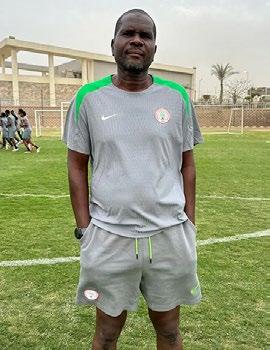

Both Nigeria and Morocco finished that day with four points, while Tunisia had one and Kenya none. With one group match remaining, Nigeria’s next opponent was Kenya. That match, scheduled for May 7, became crucial not only for qualification to the quarter-finals but also for building momentum toward the deeper stages of the competition. The team knew that avoiding defeat would confirm their place in the knockout round and bring them within touching distance of the FIFA U-20 World Cup.
Kenya, appearing at this level for the first time, had found the group challenging. Despite their debut status, they remained a potential threat. Nigeria could not afford to underestimate a team with nothing to lose and everything to gain. The meeting with Kenya came with high stakes and required a professional attitude from start to finish.
The match began with a jolt. Kenya took a surprise lead in the 6th minute from the penalty spot, Kevin Injehu converting after a handball in the Nigerian box. Nigeria responded quickly with Kparobo Arierhi equalising in the 13th minute with a composed finish after a clever through ball split the Kenyan defence. Despite continued pressure, the first half ended 1-1.
Kenya shocked again midway through the second half when William Gitama finished off a flowing counterattack in the 68th minute to restore their lead. However, Nigeria’s response was again swift. In the 72nd minute, a foul on midfielder Kehinde Ibrahim resulted in a penalty, which captain Daniel Bameyi confidently dispatched. The 2-2 draw was not the dominant display Nigeria might have hoped for, but it was enough to secure second place in Group B, with five points from three matches.
Nigeria’s preparation for this tournament had included winning the WAFU Zone B tournament, a success that confirmed their readiness for regional competition. That triumph also provided an opportunity to shape a squad capable of competing at the continental level. Zubairu’s side showed cohesion from the early stages of the WAFU campaign, and those foundations carried into the first two matches in Egypt.
Tactically, Zubairu’s methods focus on high energy and positional discipline. The 4-3-3 formation enables Nigeria to press with three attackers, maintain structure in midfield, and transition quickly down the wings. Against Tunisia, this shape allowed for compactness, while against Morocco, the same shape adjusted depending on the demands of the match. It is a system that gives room for both defensive control and attacking width.